#accepted: othello
Text
I want to thoroughly find a good, “probable” fancast for Othello.
#primal needs#<- need prompting#i have an idea but idk if it will be universally agreed on and I’m willing to accept disapproval for it because I don’t know othello well#black butler#kuroshitsuji#othello#shitpost#original post#fancasting#help#scheduled post
6 notes
·
View notes
Text
the shakespeare exhibit - part 3
pairing: tara carpenter x reader
summary: in which you and tara have a study date
warnings: none
word count: 1700+
author's note: pure fluff, some fluff, and a little more fluff
previous part | next part

“Can you name three of Shakespeare’s histories, tragedies, and comedies?”
I wonder how planes fly. Like, where’s the physics in that? Tara thought as she stared blankly at the notebook in front of her, the page filled with half-assed notes about literature. And why can’t we fly? That’s bullshit.
“Tara? Are you with me?”
This mattress is really comfy. I should ask her where she got it.
“Tar?”
Tara glanced up at the sound of your voice, blushing as she realized that you had been asking her a question, which had promptly flown over her head because of how boring the topic was.
“Sorry, what was the question?” she asked sheepishly, smiling at the way you giggled.
“Three histories, three tragedies, three comedies,” you said.
She’ll be lucky if I can even name three plays in general. Tara huffed, pulling her bottom lip between her teeth as she thought. “Okay, comedies: Twelfth Night, The Merchant of Venice, and…uh, The Winter’s Tale?”
You tilted your head, eyes narrowed as you thought about her answer. “Twelfth Night and The Merchant of Venice, yes, but The Winter’s Tale is technically labeled as a tragicomedy nowadays.” What the fuck is a tragicomedy? Tara thought. She blinked at you, and you clicked your tongue. “I think your professor would accept that, though. Next?”
“Othello, Antony and Cleopatra, and Titus Andronicus--tragedies.” You nodded, not even sparing a glance at your own note sheet that you had pulled out to help Tara study. How does she just know this shit off the top of her head? “And histories? All of the Henry plays.”
You chuckled. “Can you be more specific?”
“No.”
“Tar, come on.” You crossed the room and sat on your bed, leaving your desk abandoned. She held her breath at your sudden closeness, your shoulder nudging against hers as you pointed at her notebook. “You have them written down.” You squinted. “I think? Tara, I can’t even read this.”
She looked down at her notes. What she had thought was legible writing was, in fact, just chicken-scratch. “Oh,” she said. “I think I was falling asleep during this lecture.” She sighed and leaned back against your pillows. “This is stupid. I’m a film major! I don’t need to know about Shakespeare or Hawthorne or the Pope!”
You furrowed your eyebrows. “Do you mean Pope, as in Alexander Pope?”
Tara frowned. “Same difference.”
“I don’t think that’s how that works.” You shook your head, giggling. “Look, I know you find literature boring--”
“Literature is the bane of my existence,” she stated, crossing her arms over her chest.
You leaned back, and Tara tensed as you placed your head on her shoulder. Must. Stay. Perfectly. Still.
“You didn’t have to take Intro to Lit., you know. There’s a lot of other courses that could’ve fulfilled this credit.”
She grumbled. “Mindy told me to take it. She said it would be easy.” She clenched her jaw. “It’s not easy.”
A laugh erupted from your throat, shaking Tara’s frame, and a grin pulled at her lips at the sound. “Of course she would think it’s easy, Tar,” you said. “She likes literature.”
“Whatever,” she huffed.
You sat up and twisted yourself so that you could look at her, your eyes soft and smile softer. “Come on.” You pulled lamely at her arm. “We’ve gotta get back to studying.”
“Fine.” She sat up and rested her chin on your shoulder. “But I’m not happy about it.” She felt as you shivered when she spoke, her breath painting over the skin of your cheek.
Your eyes flitted down to her lips, and just when she thought you were about to lean in, you asked, “Can you explain the idea of the Blazon to me?”
She clamped her eyes shut. This girl will be the death of me. She opened her eyes, looked at the small smile that was always on your lips whenever you were around her, and sighed out, “Okay.” And I’ll gladly accept that death.
* * *
“There’s only, like, three more authors we have to go over, Tar.”
It had been nearly four hours since you had moved away from Shakespeare and onto the other works that Tara had been reading for her literature class, and it was safe to say that Tara was burned out.
“Can’t we just take a nap or something instead?” she asked. She tugged at the sleeve of your sweatshirt to pull you to lay back with her. “Or make out?”
The tips of your ears turned bright pink, and she was sure that if you were facing her, the rest of your face would be the same hue. “Shut up,” you mumbled. You looked at her, and her guess was proven correct--you were blushing all over. “We have to do Emily Dickinson.”
“Oh! Like that TV series with Hailee Steinfeld.”
Your eyes widened. “You watched that?”
She shrugged. “Some of it, but I was only paying attention to--”
“Hailee Steinfeld, of course.” You chuckled. “You didn’t listen to any of the poems, did you?”
She waved you off. “Of course I didn’t.”
You shook your head and looked down at her notes, eyebrows furrowing and a scoff pushing past your lips. “You guys didn’t even read any of her best poems,” you said. You stood suddenly, and Tara watched as you crossed the room to your backpack, pulling out a small, battered, leather-bound journal. You cracked it open. “Like, how did your professor never assign ‘I Cannot Live With You’?”
Tara shrugged. “Never heard of it.”
You cleared your throat. “‘I cannot live with you,’” you began, taking small steps toward the bed as you read. “‘It would be life--, and life is over there--, behind the shelf.’” You sat on the edge of the bed, eyes still trained on your notebook. “‘The Sexton keeps the key to--, putting up, our life--his porcelain--, like a cup.’”
Tara listened as you continued to read her the poem, her heartbeat speeding up at each word that rolled off your tongue. You looked so peaceful reading poetry, like you had just made your way home after a long trip, and she gulped. Jesus Christ, she thought. Could she be any more perfect?
“‘So we must meet apart--, you there--I--here--, with just the door ajar, that oceans are--and prayer--, and that white sustenance--, despair,’” you finished, glancing up at her when you were done. She was staring back at you with half-lidded eyes and her mouth slightly agape. “Isn’t it beautiful?”
“You’re beautiful,” she breathed out, and you smiled, blushing again. “Can we makeout now? Because that was, like, the hottest thing ever.”
You shut your journal and threw it near Tara’s notebook. “You’re horrible,” you joked. She shrugged, like she couldn’t be blamed for wanting to pounce on you. “Since your mind is so set on kissing me, let’s turn your studying into a little game.”
Tara eyebrow’s furrowed. Why won’t she just make out with me? “A game?”
“I’ll ask you questions, and if you get them right, you’ll get a kiss,” you said. She nodded fervently and sat up, hovering over her notebook.
“Okay! I’m ready!” She glanced at you, watching as you giggled to yourself. “Also, before we start, is this entire thing”--she pointed at your journal--“filled with poems?”
You shook your head. “The back half is poems, the front half is plays and novels.”
She picked up the little book and opened it, eyes widening at your delicate handwriting detailing different plays that you wanted to read or novels that your professors suggested. She flipped to the back half, where she found pages upon pages of poems written out, some from Emily Dickinson, some from authors she had never heard of in her life.
“You’re such a nerd, you know,” she teased, putting the journal back down.
“Yeah, a nerd that’s gonna get you a passing grade on this damn midterm.” You grabbed her notebook from her, leafing through the pages before settling on a topic. “Okay, what literary period was Alexander Pope in?” you asked.
“Uh, an old one,” Tara said lamely.
You glared at her lightly. “Tar, I’m not kissing you until you get one right, so you might as well try.”
She huffed. “Fine.” Literary period? Stupid. It’s all stupid. “The Restoration?”
“Close,” you said. “Wanna try again?”
“No.”
You rolled your eyes teasingly. I’d like to see her eyes rolling in a different way-- “It’s the Augustan Age. What about Jonathan Swift?”
“Oh! I know this! It’s also the Augustan Age, ‘cause he and Pope were friends.”
You tilted your head. “They weren’t really friends, but--”
“But that’s right, isn’t it? Don’t I get my kiss now?”
You chuckled at her eagerness. “You sure do.” Tara leaned forward, and she frowned when you put a hand on her shoulder to stop her. “If you can name one piece that Swift wrote.”
She gasped, placing a hand on her chest. “You said you’d kiss me if I got a question right!” she whined.
“I also said I’d get you to pass this test.” You raised an eyebrow at her. “So, what did Swift write? Give me literally anything.”
Cruel Summer, Cardigan, Back to December. She shook her head. That’s Taylor Swift, stupid. Jonathan Swift, on the other hand…
“Uh, ‘A Modest Proposal’?”
You leaned forward, pressed your lips to hers, and she grinned into the kiss. Win!
“Good job, baby,” you said when you pulled away, your eyes widening when you realized the pet name that had slipped out. “I mean, uh--”
“‘Baby’, huh?” She bit her bottom lip and smiled. “I could get used to hearing you say that.”
bonus: “i got an A on my midterm!” tara exclaimed from where she sat at her desk, eyes on her laptop, which displayed the grade that had just been released.
mindy, who was scrolling through her phone on tara’s bed, jumped at the sound. “you got an A? On Intro to Lit.?”
tara grinned. “it pays having an english major for a girlfriend.”
“girlfriend?!” mindy immediately started scrambling on her phone, and tara heard her own phone buzz on her desk a minute later. she picked it up, glancing at the screen.
you :D (9:43pm): girlfriend, huh?
you :D (9:43pm): i wasn’t aware we were girlfriends yet
tara (9:44pm): hold that thought
tara twisted in her seat, eyes narrowed at mindy. “i swear to god, i am going to strangle you.”
#tara carpenter x reader#tara carpenter#tara x reader#jenna ortega x reader#jenna ortega#jenna x reader#scream 5#scream 6#museum tara
758 notes
·
View notes
Text
"Marchil? I guess I can see it on Chilchuck’s end, but what about Marcille’s? What makes you think she could develop feelings for him?" I’m glad you asked!
The first thing to note is that she does think highly of him

In the page on the right, literally defending his virtues and literally comparing him to Dalclan. And oh…
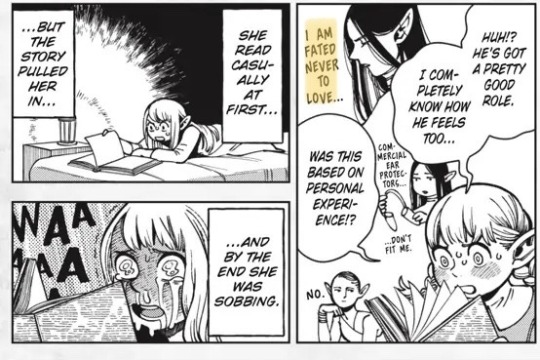
She does love a brooding mysterious guy who closes himself to love.
But surely, Chilchuck isn’t her type at all, right? He’s not princely or knightly at all. In apperances certainly not, both looks wise and demeanor wise, but then that’s why she seeks to know him on a deeper level, to not only look shallowly.
And hmm. Chilchuck really is quite selfless isn’t he? Always looking out for others, and saving specifically her often, always making sure himself and, staying in or even running towards danger for her sometimes. Modesty is often considered heroic…
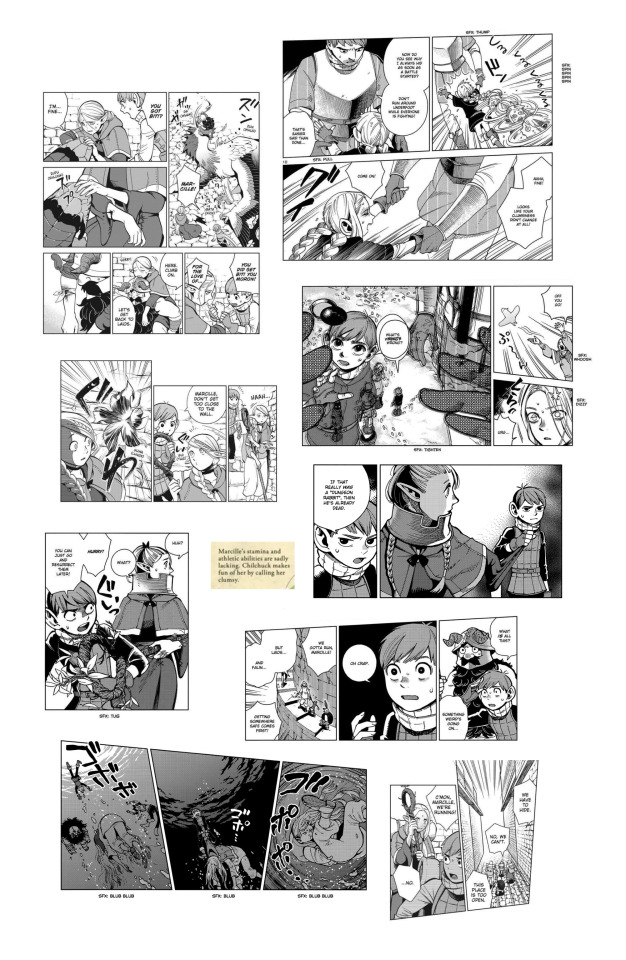
And can we talk about that drowning one… You can definitely frame the special attention as him knowing she tends to hesitate or be clumsy, and then his insistance on pulling her out of danger that she’s the healer aka the most important to keep alive, but. From the one who says that he just keeps his ass out of fights and won’t help this is a lot of risk to take, and he does die trying to pull her to safety in the dungeon rabbits chapter.
And the drowning bit??? That’s when the dungeon collapses. The only reason they DON’T die of drowning here is that the water then gives way to outside. There was NO hope of pulling her to safety here and resurrections would likely not work either, he truly preferred to die with her than try to survive himself.
Sit your ass back DOWN you are in no state, self-sacrifical hero much damn
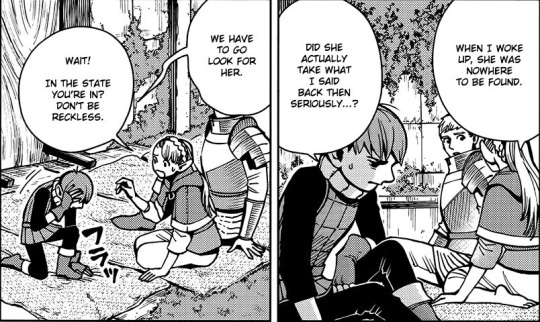
And Marcille definitely noticed this imo, after all she loves learning all she can about him, remembering things like how he hates waiting on people too. She pays attention to him and what he does and what he says.
This to say that it’s notable, whatever reason for it you may think (though we know by this point at least she was already aware he was an adult though it wasn’t internalized), out of everyone it’s Chilchuck’s bed that she wants to sleep in during the Golden Kingdom stay. He’s safe and comforting to her: dependable, the defining trait in her view of him as is shown by the relationship chart in the Adventurer’s Bible.
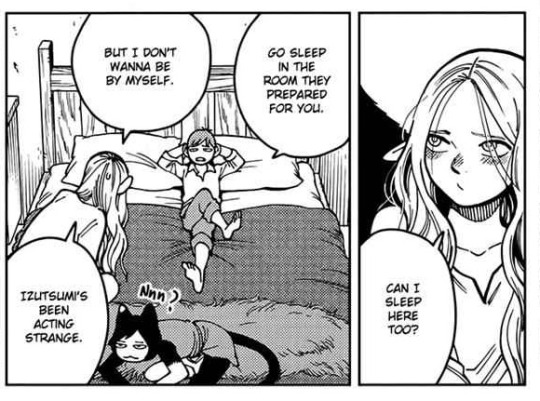
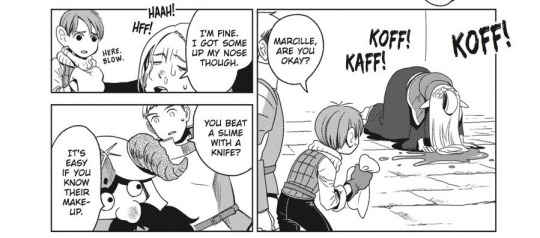
^ Lending handkerchiefs is a romance trope btw and handkerchiefs have irl history of being used for courting. Especially in old English literature and plays like Shakespeare’s Othello, and personally I do see a lot of Shakespeare in Dalclan (nobility political drama with some romance). There’s how his cowl is a dearly beloved souvenir from his family too, there’s a lot of aesthetic tropes you can apply to him.
All this to say you can 100% romanticize Chilchuck into a princely noble guy if you try and that’s exactly what Marcille does with the wife roleplay. She doesn’t need much in the first place, she latches onto crumbs and makes aesthetic narratives out of details, give her an inch she’ll take a mile.
But what’s interesting about the shift throughout the arc of her and his relationship is that she starts out idealizing him into a little angel of a kid (shapeshifter), and she ends it idealizing him as a virtuous husband and family man instead.
And what’s doubly interesting is that in the former, she’s actively warping who he is personality and demeanor wise to fit the aesthetic, he doesn’t have that bitter pride of not asking for help and the edges have been smoothened. But what she does during the wife roleplay is something else, she acknowledges the flaws and just… Accepts them, rolls with them. She’s aware of his flaws and implements them into the narrative, but the reason why his wife left doesn’t capitalize on them even, rather Chil is chilblivious and his wife loves him very much still, she’s just testing him after having had a night of feeling out of place at his side.
And this is what separated the idealization vs romanticization, she’s not twisting him into someone else she’s just uplifting what he is and focusing on the good sides.
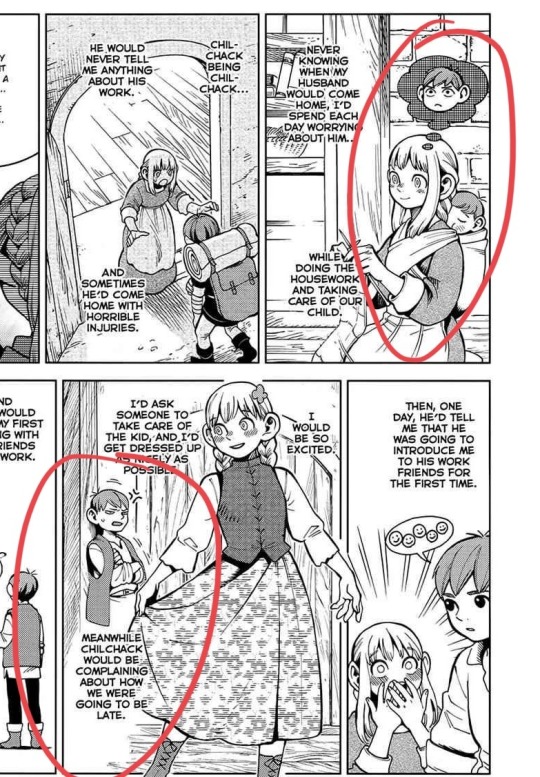
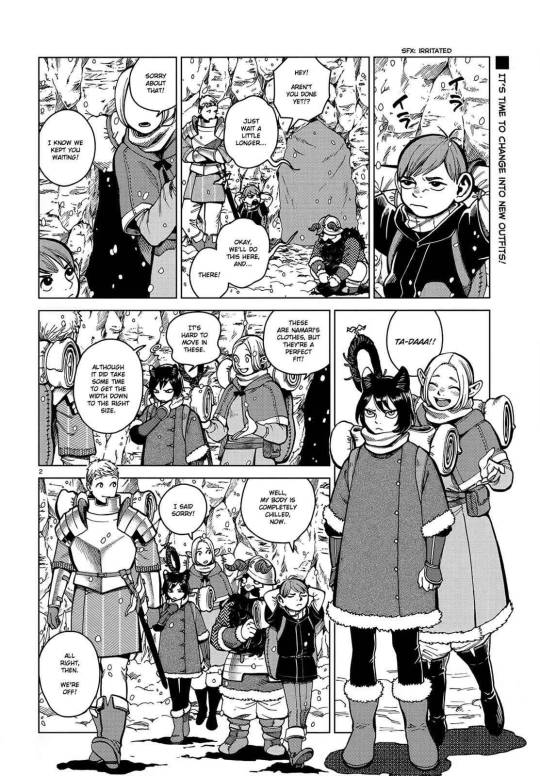
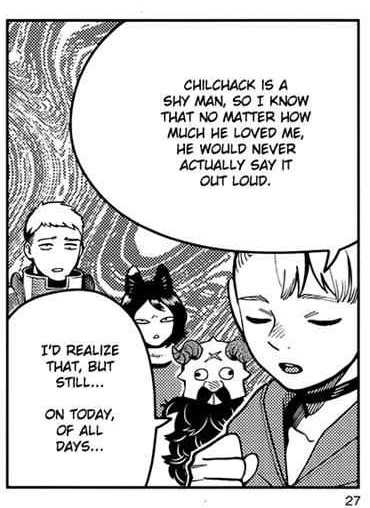
Marcille: "he has a shitty personality sometimes but if he was my husband I’d still cherish him"
"If I were your wife I’d be overjoyed to go out with you and would get myself prettied up while you complain about me taking a long time, your friends would tell me that I’m nice and that’d make me happy, but I’d also be sad because you wouldn’t tell me that you love me enough"
He’s angry and his wife left him, he’s *flawed*, but he’s still worth hyping up, still worth having his own romance story, still has a shot of winning back his beloved. She sees him for what he is, human and real and not a carefully scripted character that fits an aesthetic, and she thinks it’s still worthy of love and admiration and fighting for
And what’s funny too is that you might expect her to cool down on him once she learns more about him but actually she only gets increasingly into his business. You tell her your age and next thing you know you promise to introduce her to your family. Give her an inch she takes a mile. And too the thing is, Senshi is equally mysterious but she doesn’t pester him like at all, asks him ONCE about his succubus and he doesn’t even answer and that’s like… It.
With Chilchuck it starts off innocently enough with her wanting to know his age, hometown, the stuff she mentions having asked pre-canon. But it just keeps and keeps going and escalating. Think she’ll be satisfied now knowing you have a wife and kids, maybe she’s disillusioned now? Wrong! She wants to know their names and ages and occupations and hey how did you propose to your wife? Do you think she’ll stop after meeting them? What’s next? What will she want to know next????
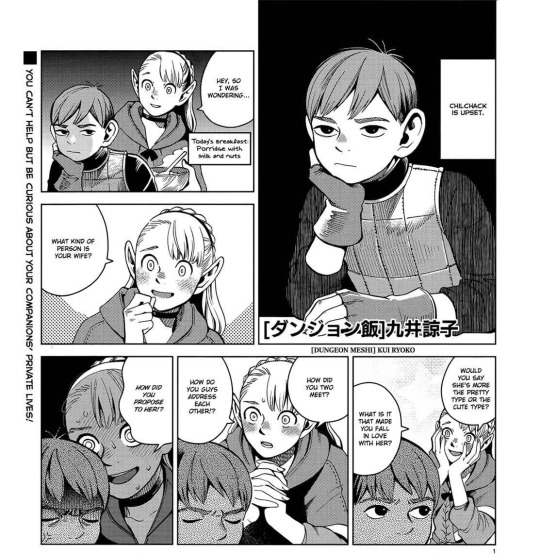
She’s… Like it’s not a reach that Marcille is all over him. Like it doesn’t mean it’s romantic but she just is. She is not normal about him idk. Can you not ask him about what tongue technique he used when first kissing his wife, give the man breathing room
Marcille could literally go "if I was Chilchuck’s wife" having deeply thought out the hypothetical and people would still ask where anyone sees any romantic potential between them. Oh wait
There’s a platonic explanation for everything (almost?) in Dungeon Meshi don’t say I’m saying otherwise, but it’s definitely not like there’s nothing here to read into lol
Going off a bit more under read bc it’s my fave topic
Marcille has a whole theme with the charming prince trope with her idealization and storybook motif and Chil is kinda the "Well someone perfect like that isn’t very realistic and romance is usually more complex and that’s ok and good and flawed people can still be ✨virtuous✨" catalyst
Do you see do you see she starts canon thinking the most romantic thing is a prince charming but her arc in the end has her romanticizing an average, flawed, real and realistic family man, who’s on the poorer side and is on the verge of divorce. And that’s what he needed, too, seeing the positive of himself and the situation instead of focusing on the negative is explicitly what inspires him to hope that he might be able to reconcile with his wife, gives him the courage and self-esteem to shoot his shot.
He IS a prince figure instead that now it’s not about idealizing the grand and overt it’s about romanticizing the small things in real life!! About finding joy and beauty in things that seem normal or mundane and uplifting them to make the world feel kinder!!!!
He’s the devoted virtuous man that she wantsss not the storybook prince that’s unrealistic and could crumble like a script at any time. He’s the perfect example of a flawed realistic but virtuous & devoted & loving man. Far from a prince charming, but not fully detached from it either. Something worth fighting for despite the flawed cracks.
Like literally, flawed romance being worth fighting for is literally the finale of Chilchuck and Marcille’s arc on the matter, where their separate arcs and issues intersect at the most crucial moment.
Marcille is important to Chil’s arc not only because of her optimism, but also because of her interest and knowledge in romance & matters of the heart, and that’s what he needs to both open his heart up to hope and to try to reconcile with his wife, like idk sounds gay
Their arc together is literally learning to 1) see each other for how they are and not undermining their qualities capacities etc etc while still not leaving flaws unchecked either and 2) opening up to people. Marcille LITERALLY makes Chil open his heart up to hope like idk man. What do you want from me. He’s literally the guy helping her through deconstructing novels and fantasy and rose tinted glasses and like. Deconstructing the prince charming figure into something more real but still romantically beautiful like KUI KUI STOOOOP STOP I’M ALREADY HOOKED I’M ALREADY-
Ok fine that’s me reading into the tropes too much forgive me for being storybook brained but like. Speaking his heart out to a lone woman on a balcony, Romeo and Juliette shit, asking if she, too, doesn’t want to meet his family, madly blushing.
And like she’s learned with Chilchuck it’s all in the little things, all the implications he cannot speak aloud. She does reciprocate, does blush madly back, and the first thing she does is shower him in flowers and jewelry and what in her heart is coded as romantic gifts
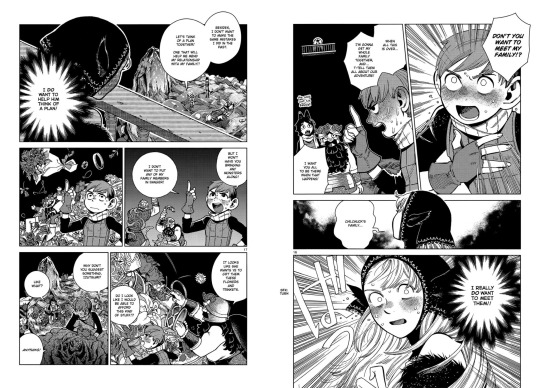
A lady, stashed away in a high tower by her lonesome, waiting for someone to call out to her from below… Romeo courting type shit with an offer, a heartfelt spiel, implicit confession from underneath her balcony. Offering him flowers because he succeeded in calling out to her heart…….. And they have to climb to her too…. Crazy
Doesn’t it sound like a proposal. One that’s both so storybook-like and not, contrastedly real and grounded, all about the implications rather than in your face grand gestures, "Don’t you want to meet my family?". They literally have an arc about the topic of romance and this is the climax/pinnacle of it like god??
This is @ the woman who said "Chilchuck is a shy/bashful man so I know he wouldn’t tell me he loves me, but…" btw
To quote a friend, truly the shiny secret unlockable dating sim capture target :
THE DUNGEON LORD BIT WAS SO FUNNY BECAUSE HE KNEW SHE'D TAKE IT HOOK LINE AND SINKER
HES THE ONE WHO GOT HER TO TURN AROUND COMPLETELY
SHES LIKE. WIDE EYED
FLAG RAISED???? FLAG RAISED WITH CHILCHUCK 👀👀👀‼️👀👀‼️👀
And the way that this is the culmination of their arc together… Like people are not ready for the ‘Chil calling out to dunlord Marcille on the balcony has Romeo and Juliette romance novels imagery’ take. Or the ‘their arc is about growing to see beauty even in the non-idealized, in the flawed and in the real’ take which makes it so so perfect if she were to lower her ideal from a charming elven prince to a virtuous halfling man (which she does end up romanticizing)
So there, you got to witness in real time what happens when I think about marchil for longer than 2 minutes, there are so many layers it’s a deranged rabbithole. I saw the necronomicon of subtext and it’s driving me to madness with forbidden knowledge that no one else sees
……. Like what if I told you she implicitly picked Chilchuck over a "unrealistic prince charming who’s actually disingenuous" much earlier in the story already. If she was given the choice to think through going with a guy that seems perfect and chivalrous like her succubus she’d pick Chilchuck over the other actually. If I sound insane rn tune in for my full analysis on them coming this month hopefully thank youu. Interwoven arcs of fantasy vs reality and idealization vs pessimism I love youuu
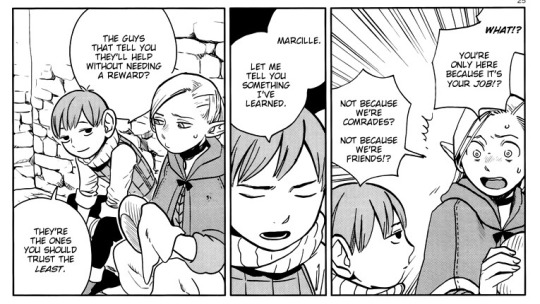
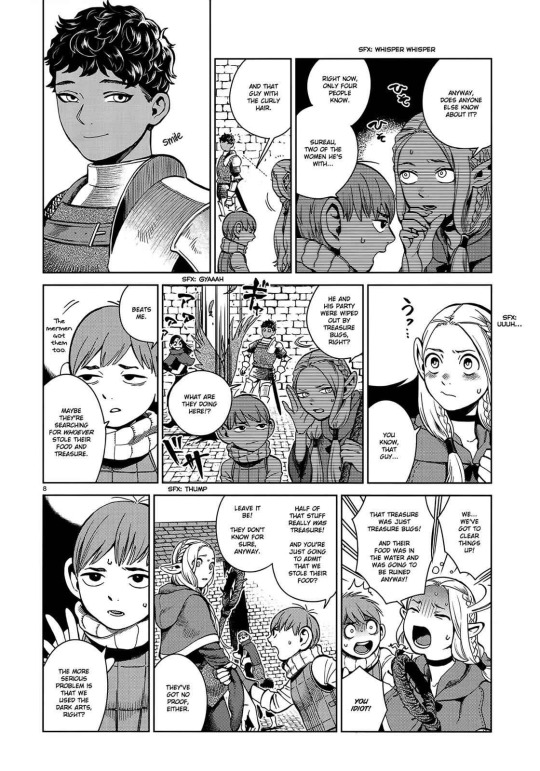
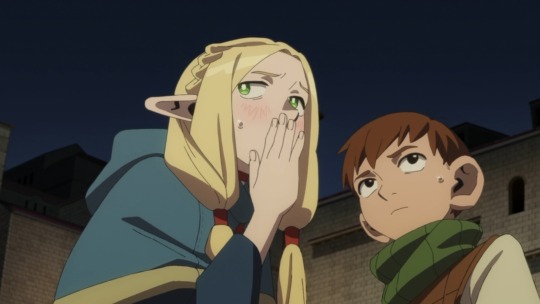
So now you know the general thesis of my planned analysis about the importance of the prince charming figure in Marcille and Chilchuck’s arc, where she romanticizes things to a sometimes worrying degree or idealize people into something easy and digestible and poetic (like Chil being a kid, and then him being a virtuous ✨✨✨husband), and how she needs to value aesthetics less and actual acts and facts more, be more grounded (like seeing people for what they are flaws and all, and accepting that people need money and not pulling through on principles of honor or unity shouldn’t get Namari shamed) and a part of that is accepting that Chilchuck is BOTH flawed and virtuous, a loving husband that still has shitty moods and fumbled his marriage so bad etc etc. So it’s like, her image of perfect prince charming that will whisk you away on an ethereal romance -> realistic flawed middle aged dad with personality issues and a failing marriage but he still is worthy of love and having his cute grand romance story and his happy ending.
Ik I keep repeating the same point through this but I need it to be burned into everyone’s brains it has its grip on me I can’t do this. They are so special……
#Someone did ask (on discord) btw i’m not just being a smartass though I do love being that too#This is stuff I cover in my upcoming marcille & chil arc analysis except here I can go full romo and don’t keep the strictly platonic angle#It’s at like 15k words rn I think. The 30 pics limit is killing me which is why I started asking my friend to do collages of panels for me#Sob#I keep alternating between it and the Falin analysis save me. Should be dropping soon idk i might test out having a beta reader for that on#Marchil foreplay is 2 years of being coworkers and slowly worming personal questions out of him until he blinks and she has#A key to your house#Dungeon meshi#marchil#marcille donato#chilchuck tims#like they’re so so funny look at this shit. Nonconsensual romanticizing of you as a person. Obsessive interest in your personal life#She’s latched so hard onto the “mystery” of him they’re deranged#MAYBE ITS ALL COMPROMISES MAYBE ITS ALL SWEET INBETWEENS <3#maybe we'll take our vision of what we thought we could be and make something new together. something for just us#Fumi rambles#Mann Marcille’s ‘idealizing him into liking him even for all his flaws bc his personality is often kinda shitty’ arc’#and Chilchuck’s ‘prejudice against elves and mages and optimism into respect and trust’ arc are everything to me#Meta#Spoilers#Dungeon meshi manga spoilers#Tagged this so late oops
100 notes
·
View notes
Text
reducing iago to senseless psychopathy and reducing othello to destructive jealousy are two sides of the same coin… as if the text isn’t highly specific with regards to elucidating the nature of their colonial dynamic and how it informs their psychologies. iago isn’t the devil because he’s a sadist who loves doing violence and inflicting suffering; he’s “the devil” because he’s a racist. othello isn’t jealous because he has a fragile ego; he has a fragile ego because he’s been exploited and marginalized and alienated his entire life.
iago isn’t “motiveless.” rather, the logic of imperialism and white supremacy is still so entrenched in our society to this day that we dismiss those explicitly stated motivations as baseless grounds for inciting that level of abject violence. but the narrative is merely uncovering the level of violence we do find intolerable, and through it, condemning all that came before it prior to crossing that threshold of our tolerance, before reaching that point of no return. because that’s the accepted violence that facilitates the shocking violence, begets more violence through its normalization.
to reduce iago to being merely a psychological aberration whose pathology is abnormal and senseless is to ignore the ways in which his logic is perfectly acceptable within his racist paradigm, to ignore how his manipulations only work so effortlessly because the conditions of his society have already laid the groundwork for othello’s downfall for his entire life. othello was always in a highly precarious position, and iago merely exploits that because he can, and therefore he must. iago is only considered a reprehensible devil because he’s not afraid to say the quiet part out loud. but in truth, he’s not abnormal at all; he’s the logical product of his society.
#o#othello#sorry patrick page but instead of reading the dsm you should’ve been reading season of migration to the north
39 notes
·
View notes
Text
BICHO DE PALHA
@princesssarisa @hamlet-macbeth-othello @softlytowardthesun @grimoireoffolkloreandfairytales @themousefromfantasyland @professorlehnsherr-almashy @faintingheroine @allthegoodbobdylanlyricsaretaken
(Portuguese and Brazilian Folktale)
They say that a very rich man was widowed and remarried, having a daughter, Maria, who looked young and was beautiful.
The stepmother immediately disliked her stepdaughter and became angry when she had a daughter and she was relatively ugly, compared to Maria.
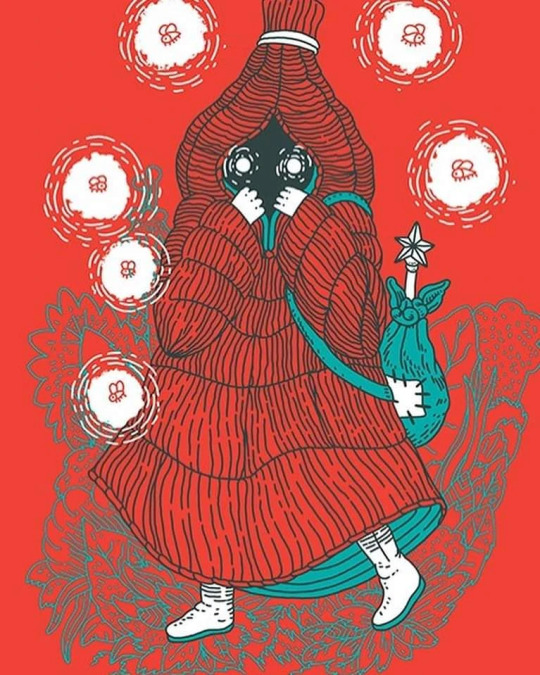
The man had scattered properties and lived traveling, running his businesses.
He only lasted a short time at home and in those moments, Maria felt better.
In her father's absence, her stepmother forced her to do the roughest and hardest jobs, feeding her the worst and in insignificant quantities.
Life became unbearable for the girl who consoled herself by praying and crying.
On the way to the river where she went to wash clothes, she always met an old lady with serene features and very kind. Maria ended up talking about her suffering and remaining silent so as not to hurt her father.
The old lady encouraged her with words full of sweetness.
As the stepmother became more violent and brutal, the stepdaughter decided to leave the house and look for work far away from that hell.
She met with the old lady and confessing her idea, the old woman agreed, gave her a lot of advice, gave her blessing and as she said goodbye, she took out a small wand, white as silver, saying:
"Take this wand, Maria, and when you are in danger, desire or suffering, you must say: "my magic wand, for the magic that God gave you, give me". And everything will happen as you ask."
Maria was very grateful and ran away. First, obeying the old woman's advice, she made a large plaited straw cloak with a hood through which there was a way to look through, and got inside.
After walking for a long time, she arrived at an important city.
She asked for a job in a palace and was told there were no more places.
She was leaving, sad and hungry, when an employee remembered that they needed someone to wash the rooms, corridors and stairs and clean the servants' quarters. Maria accepted the task and, thanks to her unique dress, they only called her “Bicho de Palha”. Dirty, silent, withdrawn into corners, always working, Bicho de Palha didn't bother anyone and everyone tolerated her.
The palace belonged to a young, well-made and handsome prince, who still had a mother, and was of marriageable age. In another palace, on the opposite side of the city, parties would be held for three days.
The girls were excited about the dances, attended by the society boys. In the palace the conversation was about the balls. Nurses, visitors and maids commented on the organization and splendor of the three elegant evenings.
Finally the first night arrived.
Bicho de Palha, through the holes in her mask, looked at the prince and loved him sincerely. She discreetly hovered near him, yearning for an order. In the afternoon, as there was no other maid around, the prince shouted:
"Bicho de Palha! Bring me a basin of water..."
Bicho de Palha took the basin and the prince washed his face. Afterwards, everyone went to the ball, some to dance and others to watch.
Being alone in her dark room, Bicho de Palha took off her cloak, took her wand and commanded, as the old lady had taught her:
"My magic wand! For the gift that God gave you, give me a silver carriage and a dress the color of the field with all its flowers."
Words spoken, the silver carriage, coachmen and servants appeared, a complete dress, from the diadem to the field-colored shoes with all their flowers. Bicho de Palha got dressed, took the carriage and went to the ball where he caused a sensation.
The prince immediately came to greet her and only danced with her, not allowing the other young men to approach her.
He confessed that he was impressed and asked where she lived. Bicho de Palha taught:
"I live on Basin Street..."
At exactly midnight, on the pretext of going to breathe the fresh air, the girl ran to her carriage which disappeared down the road. The prince was inconsolable and left the party soon after.
The other day, at the palace, the maids told Bicho de Palha about the events of the ball and about the mysterious princess who had the most beautiful outfit and the most beautiful face of the night.
The prince had dispatched many servants to look for Basin Street, but they all returned without knowing anything. That afternoon, the prince asked Bicho de Palha for a towel.
When everyone left for the party, Bicho de Palha took the wand and obtained a golden carriage and a dress the color of the sea with all its fish. He got dressed and went to the ball palace.
As soon as she entered, everyone recognized her and hailed her as the most elegant, graceful and friendly. The prince never left her side, talking, dancing, asking a thousand questions. He insisted on the girl's address.
"I no longer live on Basin Street, but on Towel Street. I moved today." It happened like the first night. Bicho de Palha invented an excuse and got into the carriage that ran like crazy.
The prince also left and spent the next day sighing and ordering the whole city to look for the Towel Street.
Bicho de Palha listened to the enthusiastic impressions of the servants in the kitchen, all talking about the prince's passion and the beauty of the girl.
On the afternoon of that day, the prince asked Bicho de Palha for a comb. Finding herself alone in the palace, Bicho de Palha invoked the power of the magic wand and received a carriage of diamonds and a dress the color of the sky with all its stars.
Entering the ballroom, Bicho de Palha received the greetings as if she were a queen. No one had ever seen such an attractive girl and such a rare dress.
The prince walked behind her like a shadow, serving her and asking everything, crazy with love. Bicho de Palha said that she had moved to Comb Street, permanently. And they danced a lot.
Close to midnight, knowing that it was the time when the girl disappeared as if she were enchanted, the prince called his servants and ordered an excavation to be opened near the palace gate, waiting for the carriage to stop.
This, however, did not happen, Bicho de Palha jumped into the carriage and it took off like lightning, jumping over the ditch, but the jolt was so sudden that one of Bicho de Palha's shoes, thrown outside the door, was lost. A servant found it and took it to the prince, who was very pleased.
Everyone looked for Comb Street in the city.
The prince decided to find the girl another way. He ordered the shoe to be taken to every house, putting it on everyone's feet.
Whoever wore it perfectly, neither loose nor tight, would be the charming girl at the dances. The servants walked up and down the street, putting shoes on the feet of the young women and the old women.
None of them could take a single step with him on their feet. The servants returned to the palace and tried putting tits on the maids and nurses. Anything.
Finally, a servant in charge remembered that Bicho de Palha had not been invited to wear the cute shoes. They all laughed, but, so that the prince wouldn't accuse them of having left someone to wear the shoe, they sent for Bicho de Palha, as a reason to laugh, and told him to try it on.
Bicho de Palha, with her wand in hand, asked that the dress from the third night of the party appear on her body, beneath the straw cape.
The prince came to watch.
Bicho de Palha, surrounded by laughing servants, put his foot into the shoe and it fit her perfectly.
Then she stretched out his other foot and everyone saw that he was wearing shoes just like the first.
They could hardly believe what they saw, when the straw fell and the beautiful girl from the three balls appeared, with the dress the color of the sky with all the stars, the diadem with the diamond moon, everything shining like the very stars of the firmament.
The prince rushed in hugging her and calling for his mother so she could meet her future daughter-in-law.
They got married soon.
Bicho de Palha told her story, and the magic wand, fulfilling the wishes of the old lady, who was Our Lady, disappeared, leaving them very happy on earth.
31 notes
·
View notes
Text
Welcome
𝄞✧˖°.ᶻ 𝗓 𐰁── ⋆⋅☆⋅⋆ ── 𐰁 𝗓 ᶻ.°˖✧𝄞

Hello sweethearts! You may call me Donatello, Donnie, Dontronn, Othello Von Ryan, or whatever appropriate nickname you want.
I am here to caregive or babysit, I am accepting of all, whether pure or impure regression, age or pet regression, doesn't matter.
I would like to say, 🐳💙 anon is my little brother(in-sys), so he may get special treatment or stuff like that. Please just be aware of that.
𝄞✧˖°.ᶻ 𝗓 𐰁── ⋆⋅☆⋅⋆ ── 𐰁 𝗓 ᶻ.°˖✧𝄞
I just want to state, I will not be online much. I'm an alter in a system, and we have many other responsibilities. I will try my best, but please be respectful if I take breaks or don't respond for a while.
I will answer from 9:00 AM - 9:00 PM CST most of the time, I may go beyond that if I feel up to it but don't expect it to happen much.
𝄞✧˖°.ᶻ 𝗓 𐰁── ⋆⋅☆⋅⋆ ── 𐰁 𝗓 ᶻ.°˖✧𝄞
A DNI Banner will be put at the bottom of this intro post, I'm too lazy to type it out myself to be honest
𝄞✧˖°.ᶻ 𝗓 𐰁── ⋆⋅☆⋅⋆ ── 𐰁 𝗓 ᶻ.°˖✧𝄞
I hope you all enjoy my cozy little place, and I hope I can make you all feel safe!

𝄞✧˖°.ᶻ 𝗓 𐰁── ⋆⋅☆⋅⋆ ── 𐰁 𝗓 ᶻ.°˖✧𝄞
Anon List; 🐳💙/Baby Brother,
𝄞✧˖°.ᶻ 𝗓 𐰁── ⋆⋅☆⋅⋆ ── 𐰁 𝗓 ᶻ.°˖✧𝄞

#agere#sfw agere#rottmnt#rise of the tmnt#rottmnt agere#tmnt agere#donnie rottmnt#rottmnt donatello#rottmnt donnie#tmnt 2018
28 notes
·
View notes
Text

The word “great” is somewhat promiscuously applied to actors. But it was undoubtedly deserved by Sir Michael Gambon, who has died aged 82 after suffering from pneumonia.
He had weight, presence, authority, vocal power and a chameleon-like ability to reinvent himself from one role to another. He was a natural for heavyweight classic roles such as Lear and Othello. But what was truly remarkable was Gambon’s interpretative skill in the work of the best contemporary dramatists, including Harold Pinter, Alan Ayckbourn, David Hare, Caryl Churchill and Simon Gray.
Although he was a fine TV and film actor – and forever identified in the popular imagination with Professor Albus Dumbledore in the Harry Potter franchise – the stage was his natural territory. It is also no accident that, in his private life, Gambon was an expert on, and assiduous collector of, machine tools and firearms for, as Peter Hall once said: “Fate gave him genius but he uses it as a craftsman.”
Off-stage, he was also a larger-than-life figure and a superb raconteur: a kind of green-room Falstaff. I have fond memories of an evening in a Turin restaurant in March 2006 on the eve of Pinter’s acceptance of the European Theatre prize. Gambon kept the table in a constant roar, not least with his oft-told tale of auditioning for Laurence Olivier as a young actor in 1963 and cheekily choosing to do a speech from Richard III; but the next night Gambon gave an explosive rendering of Pinter’s poem American Football that threatened to blow the roof off the Turin theatre.
However, Gambon’s bravura was also mixed with a certain modesty. In the summer of 2008 I met him for tea in London and found him eagerly studying the script of Pinter’s No Man’s Land, in which he was scheduled, several months later, to play Hirst. He told me that he had started work on it so soon because he found it difficult to learn lines at his age.
“Sometimes,” he said, “I sleep with a script under my pillow, or just carry it around in my raincoat pocket, in the hope the lines will rub off on me.” I think he was genuine; but with Gambon, one of life’s great leg-pullers, you were never entirely sure.
Gambon achieved greatness without either the formal training or genetic inheritance that are often considered indispensable.
He was born into a working-class Dublin family that had no artistic background; his mother, Mary (nee Hoare), was a seamstress, and his father, Edward, an engineer. When the family settled in Britain after the second world war, the young Gambon went to St Aloysius school for boys, in Somers Town, central London. On leaving at the age of 15 he signed a five-year apprenticeship with Vickers-Armstrongs, leading to a job as a tool-and-die maker. With his mechanical aptitude, he loved the work. But he also discovered a passion for amateur theatre and, having started by building sets, eventually moved into performing. “I want varoom!” he once said. “I thought, Jesus, this is for me.”
With typical chutzpah, he wrote to the Gate theatre in Dublin, creating a fantasy list of roles that he had played in London, including Marchbanks in Shaw’s Candida; in the end, he made his professional debut there in 1962 as the Second Gentleman in Othello. His best decision, however, on returning to London, was to sign up for an improvisational acting class run by William Gaskill at the Royal Court.
Gaskill was about to join the newly formed National Theatre company at the Old Vic and recommended Gambon for an audition: hence the celebrated story of Gambon’s first encounter with Olivier, which ended with the young actor, in his excess of zeal, banging his hand on a nail in an upstage column and bleeding profusely. Far from being the nail in Gambon’s coffin, this led to a productive four years with the National in which he progressed from walk-ons to substantial roles such as that of Swiss Cheese in Gaskill’s revival of Mother Courage.
On Olivier’s advice, however, Gambon left the National in 1967 to hone and pursue his craft at Birmingham rep – a shrewd move that saw him, at the astonishingly early age of 27, playing his first Othello. He moved on later to the Royal Shakespeare Company, and in 1968 made his first foray into television with the leading role in a BBC adventure series called The Borderers.
However, it was through working on another TV series, The Challengers, that he made a contact that was to transform his career. His fellow actor Eric Thompson was moving into directing, and in 1975 was set to do an Ayckbourn trilogy, The Norman Conquests, at the Greenwich theatre. He cast Gambon, against type, as a dithering vet.
He revealed, for the first time, his shape-shifting gifts; and the sight of him, seated at a dinner table on a preposterously low stool with his head barely visible above the table’s edge, remains one of the great comic images of modern theatre.
This led to a highly productive working relationship with Ayckbourn including key roles in Just Between Ourselves (Queen’s theatre, London, 1977) and Sisterly Feelings (National, 1980).
At the same time, Gambon began an association with Gray by taking over, from Alan Bates, the role of the emotionally detached hero in Otherwise Engaged (Queen’s theatre, 1976).
That was directed by Pinter, for whom in 1978 Gambon created the part of Jerry in Betrayal at the National. It was a production beset by problems, including a strike that threatened to kibosh the first night, but Gambon’s mixture of physical power and emotional delicacy marked him out as a natural Pinter actor. That power, however, manifested itself in the 1980s in a series of performances that staked out Gambon’s claim to greatness.
First, in 1980, came Brecht’s Galileo at the National: a superbly triumphant performance that brought out the toughness, obduracy and ravening intellectual curiosity of Brecht’s hero. It was a measure of his breakthrough that, as Gambon returned to his dressing room after the first night, he found the other actors in the National’s internal courtyard were shouting and roaring their approval. Two years later, Gambon returned to the RSC to play both a monumental King Lear and a ravaged Antony opposite Helen Mirren’s Cleopatra.
But arguably the finest of all of Gambon’s 80s performances was his Eddie Carbone in Arthur Miller’s A View from the Bridge, directed by Ayckbourn at the National (1987). It helped that Gambon actually looked like Miller’s longshoreman-hero: big and barrel-chested with muscular forearms, he was plausibly a man who could work the Brooklyn docks.
Gambon also charted Eddie’s complex inner life through precise physical actions. He stabbed a table angrily with a fork on learning that his niece had got a job, let his eyes roam restlessly over a paper as the niece and the immigrant Rodolpho quietly spooned, and buckled visibly at the knees on realising that a fatal phone-call to the authorities had ensnared two other immigrants. In its power and melancholy, this towering performance justified the sobriquet once applied by Ralph Richardson of “the great Gambon”.
When you consider that the decade also saw Gambon playing the psoriasis-ravaged hero of Dennis Potter’s TV series The Singing Detective (1986), you realise his virtuosity and range.
And that became even clearer in 1990 when he played the mild-mannered hero of Ayckbourn’s Man of the Moment (Globe theatre, now Gielgud, London), had another crack at Othello for Ayckbourn in Scarborough and appeared, in 1989, as a romantically fixated espionage agent in Pinter’s TV adaptation of Elizabeth Bowen’s The Heat of the Day: that last performance, alternately sinister and shy, was one of Gambon’s finest for television and deserved a far wider showing.
In later years Gambon successfully balanced his stage career with an amazingly prolific one in film and television. In Hare’s Skylight at the National in 1995 he combined the bulk and weight of a prosperous restaurateur with a feathery lightness – a skipping post-coital dance across the stage with the balletic grace often possessed by heavily built men.
Gambon was equally brilliant as a disgusting, Dickensian, accent-shifting Davies in a revival of Pinter’s The Caretaker (Comedy theatre, 2000), as a perplexed bull of a father in Churchill’s A Number (Royal Court, 2002), as a Lear-like Hamm in Beckett’s Endgame (Albery, 2004) and as a brooding, alcoholic Hirst in Pinter’s No Man’s Land (Duke of York’s, 2008). Even if Gambon’s Falstaff in a 2005 National Theatre production of Henry IV Parts One and Two did not quite match expectations, his work for the theatre revealed an ability to combine volcanic power with psychological depth and physical delicacy.
Ill health and increasing memory problems forced him to retire from stage acting in 2015, but not before he had given memorable performances in two Beckett plays: Krapp’s Last Tape (Duchess, 2010) and All That Fall (Jermyn Street theatre, 2012), where he played, opposite Eileen Atkins, the sightless but stentorian Mr Rooney.
He also continued to work in television and film for as long as possible. He belied the whole notion of the small screen by giving large-scale performances as the black sheep of a big family in Stephen Poliakoff’s Perfect Strangers (2001) and as a reclusive plutocrat in the same writer’s Joe’s Palace (2007).
He was nominated for awards for his performances as Lyndon Johnson in an American TV movie, Path to War (2002), and as Mr Woodhouse in a BBC version of Jane Austen’s Emma (2009). Later TV series included The Casual Vacancy (2015), Fearless (2017) and Little Women (2017).
In film, he had a rich and varied career that ranged from the violent hero of Peter Greenaway’s The Cook, the Thief, His Wife and Her Lover (1989), to a heavyweight mafia boss in Mobsters (1991), the aged Lord Marchmain in Brideshead Revisited (2008), a cantankerous old director in Dustin Hoffman’s Quartet (2012) and the bearded Hogwarts headteacher (whom he privately referred to as “Dumblebore”) in six of the eight Harry Potter films, taking over the role for Harry Potter and the Prisoner of Azkaban (2004) following the death of Richard Harris.
He also provided the narration for the Coen brothers’ Hail, Caesar! (2016) and voiceovers for the two Paddington films (2014 and 2017).
But Gambon brought to everything he did, in life as well as art, enormous gusto, a sense of mischief and a concern with precision: he was almost as happy restoring old firearms as he was working on a new role.
In 1992 he was appointed CBE, and six years later was knighted.
He married Anne Miller in 1962, and they had a son, Fergus. From a subsequent relationship with Philippa Hart, whom he met on the set of Gosford Park, he had two sons, Michael and William.
He is survived by Anne and his three sons.
🔔 Michael Gambon, actor, born 19 October 1940; died 27 September 2023
Daily inspiration. Discover more photos at Just for Books…?
50 notes
·
View notes
Text
OC MEME
tagged by: @hotnerdywizard (so much love sent your way ❤️)
totally not playing favorites here....

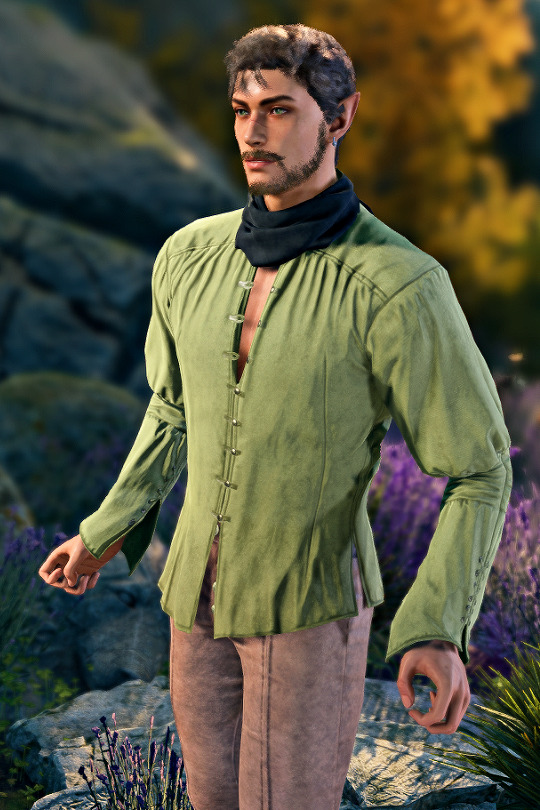
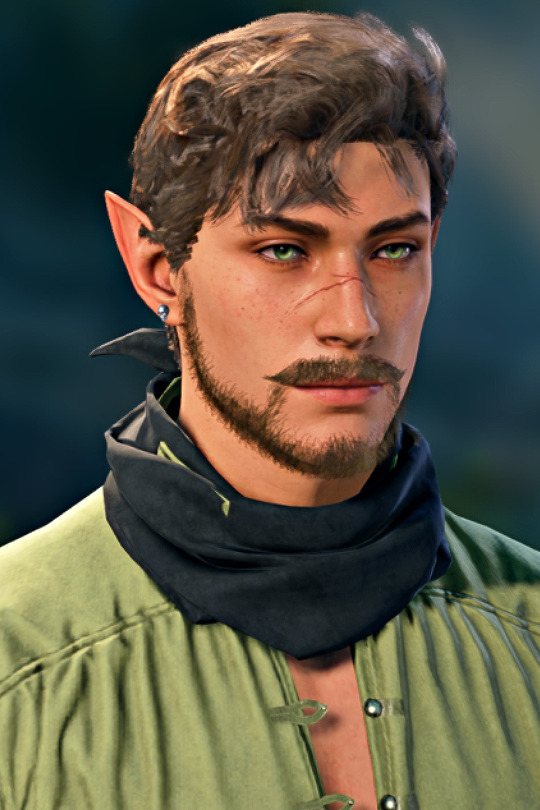
B A S I C S
- Full name: Othello Nulara, in elven "Nu" means hope & "lara" means death or victim ("the death or victim of hope")
- Gender: Male
- Sexuality: Gay
- Pronouns: He/him
O T H E R
- Birthplace: Baldur's Gate, upper city
- Job: Presently, druidic activist in Waterdeep
- Phobias: Autophobia (the fear of being alone), athazagoraphobia (the fear of being forgotten)
- Guilty pleasures: Forehead kisses and touches, sweets (mainly chocolate), romantic baths
- Hobbies: Gardening, reading (mainly in parks, hopefully with one of his partners), stargazing, astronomy
M O R A L S
Alignment: Chaotic neutral.
Sins: Murder, lust
Virtues: Gentleness, bravery, caring, loving, reliable
T H I S O R T H A T
- Introvert / Extrovert
- Organized / Disorganized
- Close-minded / Open-minded
- Calm / Anxious / Restless
- Disagreeable / Agreeable / In between
- Cautious / Reckless / In between
- Patient / Impatient / In between
- Outspoken / Reserved / In between
- Leader / Follower / Flexible
- Empathetic / Unempathetic / In between
- Optimist / Pessimist / Realist
- Traditional / Modern / In between
- Hard-working / Lazy
R E L A T I O N S H I P S
- OTP: Othello/Gale, Othello/Heron (@duvirii), Othello/Halsin, Othello/Peri (@thats-a-lot-of-cortisol)
- Acceptable Ships: None
- OT3 4: Gale/Othello/Heron/Peri
- Brotp: Shadowheart/Othello
- Notp: Any pairing that doesn't involve Othello and his boys
- Enemies/not fond of: Astarion

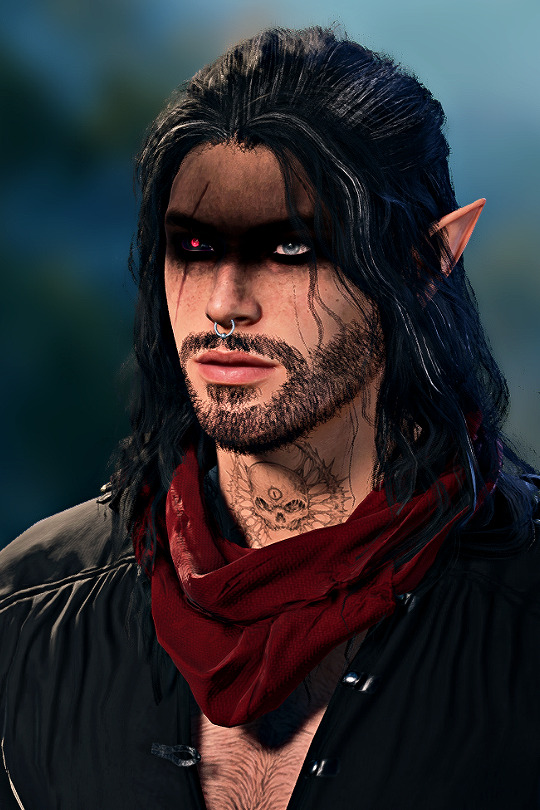
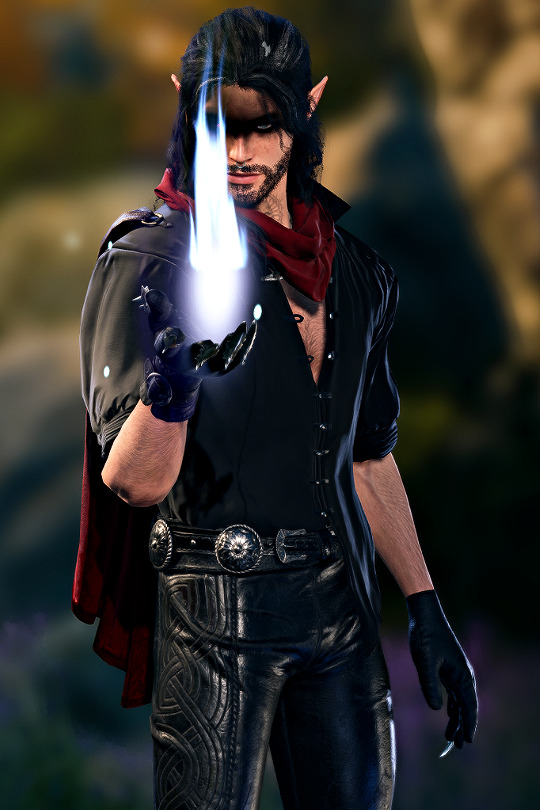
B A S I C S
- Full name: Corvus (meaning "crow") Faye
- Gender: Male
- Sexuality: Bisexual
- Pronouns: He/him
O T H E R
- Family: Father > Grant Faye; Mother (deceased) > Lillith Faye
- Birthplace: Reithwin Town, Shadow-cursed lands
- Job: Assassin
- Phobias:
- Guilty pleasures: does killing count?
- Hobbies: Writing, walks, wanting to learn how to sail, sewing
M O R A L S
- Alignment: Chaotic evil
- Sins: Murder, anger/wrath
- Virtues: Patience, leadership, honor
T H I S O R T H A T
- Introvert / Extrovert
- Organized / Disorganized
- Close-minded / Open-minded
- Calm / Anxious / Restless
- Disagreeable / Agreeable / In between
- Cautious / Reckless / In between
- Patient / Impatient / In between
- Outspoken / Reserved / In between
- Leader / Follower / Flexible
- Empathetic / Unempathetic / In between
- Optimist / Pessimist / Realist
- Traditional / Modern / In between
- Hard-working / Lazy
R E L A T I O N S H I P S
- OTP: Corvus/Shadowheart & Corvus/Astarion
- Acceptable Ships: None
- OT3: N/A
- Brotp: Corvus/Minthara
- Notp: Any pairing that doesn't involve his OTPs
tagging @hartsvale @mercymaker @rosenfey @timdownie @evermeet @vspin (feel free to ignore this, it was just a bit of fun!)
19 notes
·
View notes
Text
Enemies ends with Faith warning Buffy that if she kills her, she'll become her: "you ain't ready for that".
And sure enough, Buffy does go through a large part of the first half of the next episode convinced she's about to become something monstrous, a transformation which she's clearly not prepared for ("I'm scared Will. There's this thing in me and I can't find it. I can't stop it. What if it changes me? [...] All of a sudden I could be something that's not me anymore.")
Of course, Buffy isn't (explicitly) talking about Faith here, but (to paraphrase Xander a few episodes earlier), she is talking about her a lot. Telling Willow that "to the naked eye [kissing Faith] looked like fun", or telling Angel that Faith wasn't "so bad to have around" or that she was "hurting a lot" in a way that "some people, protective-type people" might have been drawn to, or (on a more metaphorical level), bringing up Iago's motivations for trying to destroy Othello (all of which, ranging from anger at being overlooked or sexual jealously or simply because he enjoys doing it, because he's "the dark half of Othello himself", clearly apply just as equally to why Faith has recently become Buffy's enemy.)
Of all the Season 3 episodes Faith isn't in, I think this is the one where her absence makes the most sense. Her arc this season wouldn't be as satisfying if we could read her mind and see her motivations. Just like Iago (at least according to Ms. Murray's dissertation), she's not really a person in her own right. She exists as a reflection of Buffy's own feelings, "but you never really see what's in someone's heart".
Though it wasn't the writers' concious intent, I do think you can view this season's central arc as the closest the show ever really gets to a love triangle: with Buffy forced to choose between dwelling in the comfortable past that Angel represents and the thrill of living only in the moment that Faith represents, and ultimately rejecting and accepting aspects of both so that she can move on into the future. And in this viewing, I think it's important that Angel and Faith are treated on an equal footing in this episode. Buffy doesn't get to use her newfound powers to read Angel's mind, and she doesn't get to read Faith's mind either. They are both blank slates: Angel representing who Buffy was before the events of last year, and Faith representing a possible demonic transformation (and note that the question of whether Slayers are demons or fully human will be pretty central to the next four seasons of the show).
The episode takes away Buffy's mind-reading powers almost as soon as she gets them, and while they give her a broader sense of empathy (or at least help to further develop an empathy she's been gaining since the show's first episode when she realized the difference between Cordelia being "nice" and being nice "to me, anyway") they don't help her resolve her confusion about her vampire boyfriend and "the whole bad girl thing" Faith has working for her.
But in just a few episodes' time, she's going to have to make a choice. And, coming back to her fears at the start, there's a risk that in doing so she'll become something that's not her anymore. When Xander tells Buffy in Graduation Day that he "doesn't want to lose her" before she goes to fight and possibly kill Faith, it's hard not to be reminded of what Buffy told Willow this episode. What if it changes her? What if, all of a sudden, she's not Buffy anymore?
41 notes
·
View notes
Note
tbh I don't think Kendra did much of the actual engineering part of all those schemes to kill Don, which is why she was taken off-guard when they failed. like she did do the planning, sure, she's an overdramatic Wile E Coyote just like him, but Jase and Jeremy had to build the machines for her bc every time she tried she got distracted thinking about that goddamn frog's stupid muscles and stupid face and STUPID theatre kid voice and why the fuck did he have to meet all her standards- aaand now she's got like three different soldering iron burns. oops.
it works out fine because Jeremy is better at engineering and Jase is better at coding, she's more of an all-rounder whose talents lie in figuring out how to make disparate pieces work together, but nonetheless they did still have to suffer through her complaining about the AUDACITY of this Othello Von Ryan guy to be so annoying and so hot AND so smart at the same time. how dare he make it difficult for her to truly hate him. clearly these are acceptable grounds for murder. (she bought them both Starbucks afterwards to make up for it)
You know, I'm taking this and eating it right up!!
Like I said before, I really like character development and them having a turnaround from villainy to something different. Kendra is no exception to that in my AU and mayhaps she just needs some nice people to show her the way.
I was also considering to have her go into a different field when it comes to her job and I'm liking the idea I have more and more so maybe I'll stick to that..
I have also accepted the headcanon that she calls Donnie Frog whenever she sees him from now on.
77 notes
·
View notes
Text
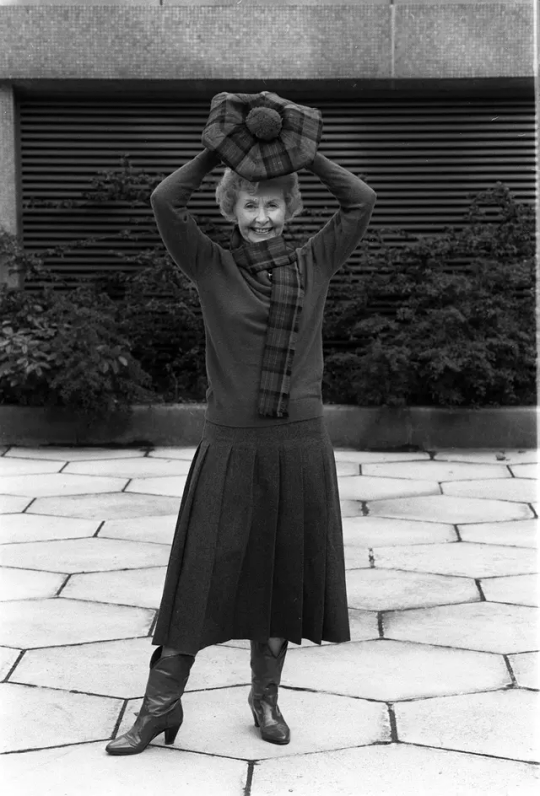
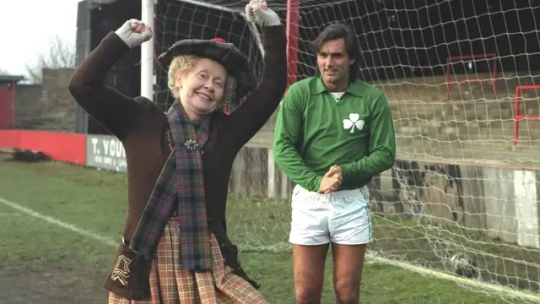
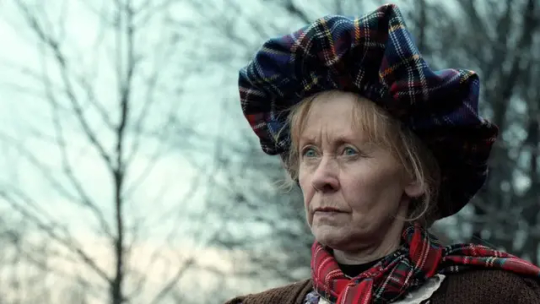

Happy 98th Birthday the Scottish actress Gurdrun Ure.
Every year when I get to this anniversary I have a wee smile, Gurdrun was born on 12th March 1926 in Campsie, Stirlingshire, making her probably the oldest living person feature in my posts.
A lot of people , even now thought that Supergran was played by Rentaghost actress Molly Weir who passed away in 2004 aged 94, and theatrical rag The Stage even confused the two in Molly Weir's obituary, but it was always Gudrun in the award winning series, I must say I never confused the two, I loved Supergran, the series based around a grandmother with super powers. I even found a picture tagged Gurdrun that was in fact Mary Ure in one source, as far as I am aware they are not related.
The show was made for Tyne Tees Television for Children's ITV and became hugely popular with people asking 'Is there nothing that she cannae do?'. Gudrun's enemy on the show was The Scunner Campbell played by the late actor and theatre director Iain Cuthbertson and the show was so popular it won an Emmy, and was sold to over 60 countries worldwide.
In the mid-50s, she decided to start using the name "Ann Gudrun" to make it easier for her audiences but, by the 60′s it looks like she had started using her real name, according to IMDb, certainly though by the times her bout of fame came about in the 1980s she had reverted back Gudrun Ure in a new climate of more acceptance of unusual names.
Gurdrun starred in Orson Welles' 1951 stage production of Othello and also appeared in 1953 film 36 Hours at the age of 27 under the artist name Ann Gudrun. She later appeared in shows including T-Bag and the Pearls of Wisdom, Midsomer Murders, The Crow Road, Where the Heart is and Casualty, the latter being her last TV role in 2009. She also appeared around the country on stage and on radio.
Oh and the name originates from the old Norse language, but is also nowadays has been one of the most frequently given female names in Iceland as Guðrún.
There has been a buzz kately that a big screen version of the show may be in the air, Tilda Swinton, an adopted Scot has been mooted for the lead role.
15 notes
·
View notes
Note
For the micro stories, total control or comfort food please :) -wayhavenots
36. total control
41. comfort food
Milton's good intentions are nearly foiled by the foxhound skirting his ankles. The dog bolts past him in a frenzied bid to leap atop Natalie's bed and her brother teeters, stumbles, then rights himself, blinking. The wooden tray he blessedly doesn't drop is holding her favorite foods of comfort; beef roast and pudding, buttered bread and cider. He looks to her and says blithely, "Not to worry, I have total control. Oh, down Leto, you brute."
Natalie marks her book and weakly maneuvers herself by the elbows into an upright position, accepting the canine licks to her face with fond laughter and generous scratches behind the ears. The runt of one of her father’s hunting litters, Leto had refused to latch to his mother and was slated to die by the kennel masters. That had been two winters ago, before Natalie had taken the pup in to rear with equal parts compassion and determination for him to not only live, but prosper.
"He's not a brute," she says, not for the first time, her voice rasping with the illness that clings to her. "And he's perfectly welcome here. Or anywhere he pleases."
"He'll ruin your precious book, and the linens to boot," Milton chides in good humor, eyeing the huge quantity of novels that near entomb her on the bed. "Don't feel sorry for him Nattie, he's only here for the roast."
"He's here for me - he knows I'm ailing, don't you dear one?" She clicks her mouth and purses her lips and makes sweet, affectionate sounds at the hound panting over her. Leto wags his tail with her attention and Milton chuckles - a warm, resonant noise - then hoists the dog gently from her lap to set the tray in place. The mattress dips as he settles beside her.
"I'm here for you. I intercepted the cook so I could be the one to bring you this. Aren't you glad for my company? It's better than dusty old Othello's, to be sure."
Natalie smooths an apologetic hand over the leather bound cover, and then reaches to pat the crook of Milton's arm in deference. "While Othello has been a fine companion, nothing could ever take the place of you, rabbit. You know that."
He smiles at her with slight exasperation, blue eyes shining like sapphirine brooches. "And glad I am for it. Now, where were we last? You were telling me how the scheming duke had just whisked the pair of them off to Cyprus..."
#my writing#the wayhaven chronicles#twc#idk why my mind went to a milton and natalie moment but here we are#i cheated bc comfort food is not per se a historical term. but we are ignoring that. everyone refocus on milton and nat :)) yaay
24 notes
·
View notes
Note
Brad and Bergy as Judas and Jesus 👀👀
Oh, so we're doing this?
Okay. Buckle up. I have Thoughts. I have Feelings. I Don’t Have a Brain to Mouth Filter.
So first of all, Brad Marchand did all the heavy lifting for me on this one. Him talking about Patrice Bergeron being ABOVE??? JESUS??? HELLO??? Their relationship. Their personalities. The “Saint Patrice” nickname. The dedication. The potential for ANGST

The way Marchand looks at him.

ALL THE TIME.
I didn’t make this up he did this to himself.
(note: I’ve seen other people talk about this as well. Linking this post by @hard4softthings because I like the way they phrased their response, but there’s other people who’ve been talking about this recently I just don’t remember any specific posts.)
Now. Here comes the Narrative:
We’re all on Tumblr so we’ve probably all come across this line from Stephen Adly Guirgis´ The Last Days of Judas Iscariot (2005) that reads like a punch to the fucking gut:

Which is an INCREDIBLE line, but the play itself is actually .. um.. a very different vibe:
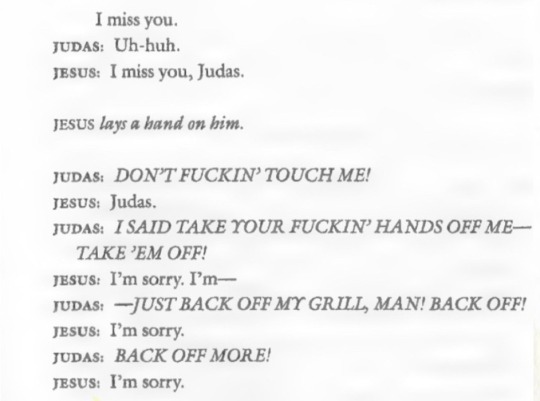
Tell me Judas doesn’t read a whole lot like Brad Marchand. I dare you.
The line that precedes this is also pretty Brad/Bergy.

Is it ever anybody else? No. It’s Patrice Bergeron and Brad Marchand and it’s BEEN the two of them together at the centre of all this for years. It’s Jesus and Judas, Bergeron and Marchand, their names go together.
One of my personal favourite Judases is played by Carl Anderson in Jesus Christ Superstar (1973). He really embodies the Tragic Villain I believe Judas to be. In several of his lines/lyrics he talks about the myth/person dichotomy. He loves Jesus of Nazareth, but does not know how to feel about Jesus Christ the Son of God.

Link
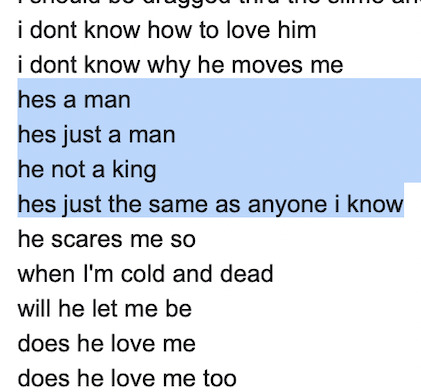
Link (SERIOUS TRIGGER WARNING: SUICIDE)
Which becomes especially relevant if you think about Bergeron being Saint Patrice, and Marchand being The Rat.
Borrowing from Frank Bidart’s “Guilty of Dust”:
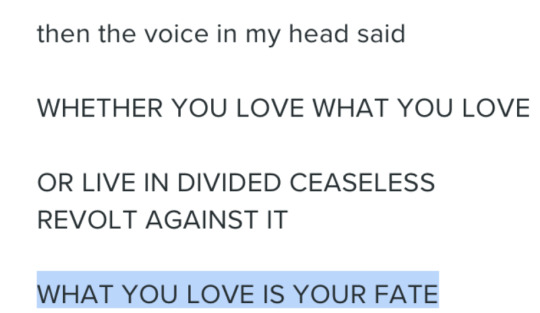
Except we’re taking the Mythology approach to this: your name is your fate.
Now the real tragedy of Judas Iscariot is that his name is Judas Iscariot. We are all familiar with the bible story and as a result, the actor playing the part of Judas simply HAS TO betray Jesus. It’s what his entire identity is centred around. If he didn’t, the audience wouldn’t be able to recognise the character as Judas.
(Obligatory Richard Siken:

Snow and Dirty Rain)
That’s just tragic inevitability for you bay-bey.
In Jesus Christ Superstar, Judas’ name is repeated twice right after he betrays Jesus:

“Well done, Judas. Good old Judas” = Good job person who claims to be Judas, you have betrayed Jesus and proved yourself to be Judas. You are now “Good old Judas”, which is to say, the Judas we recognise from the Bible.
A lot of theatre productions play with this idea of inevitability & living up to ones name in interesting ways.
(See: Shakespeare’s Antony & Cleopatra & their repeated failure to live up to their own myths / Troilus & Cressida “This is and is not Cressid” (5.2.175) when Cressida lives up to her name by being unfaithful, which Troilus thinks is unlike the Cressida he knows personally / Iago’s “I am not what I am,” (Othello, 1.1.65) - I am Othello’s loyal friend except that I’m not, I am Iago & will betray Othello, except that I am not yet because I haven’t betrayed him yet & earned the name Iago)
In Terrence McNally´s play Corpus Christ there is a moment where Judas becomes Judas:
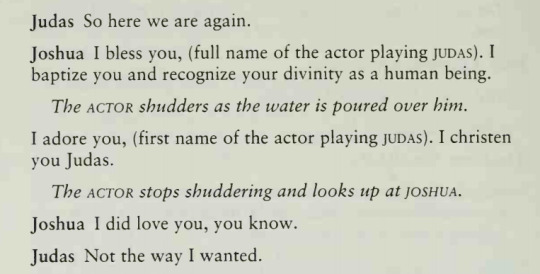
The actor stops shuddering, has now been Named Judas and will go on to fulfil the ROLE of Judas.
In the case of Marchand and Bergeron I am most interested in the ways in which their nicknames become their fate:
Brad the rat - This one’s relatively straight forward. Marchand accepts this role and really works hard to seep living up to it. He has received the Rat label and My God he will act like the rat you think he is.
Saint Patrice - a nickname Bergeron has said he does not particularly like or agree with, but which DOES affect his behaviour and our perception of him. If Bergeron was to take on the role of the rat, that would be weird and uncomfortable to us. We expect Patrice Bergeron to act “like himself”.
Which ties it back to Jesus Christ Superstar: “If you strip away the myth from the man / You will see where we all soon will be”. Carl Anderson’s (brilliant) Judas struggles with the fact that he loves Jesus the man, but not Jesus the myth. In the case of NHL stardom you can look at this in terms of the difference between their on-ice personalities vs. their off ice friendship. Brad loves Patrice The Man, Patrice His Friend, he is less concerned with Patrice The Myth.
I also cast Brad as Dionysus in my little hockey mythologies. There are a few obvious (and slightly silly) reasons for this: Dionysus being the god of the grape harvest (read: wine, drunken revelry), festivity, insanity, (religious ecstasy .. interpret that however you will.. ), but it is partly because Dionysus is the god of theatre.
(I will circle back around to Brad/Judas I promise)
Dionysus = Theatre = The Rat Persona As Performance
(Note: person/persona/personality, from πρόσωπον or perhaps persōna = mask)
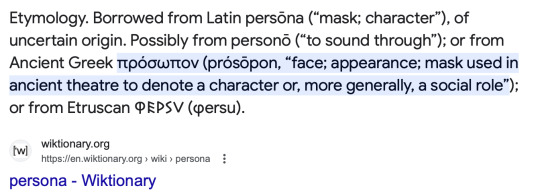
Now this idea of the Persona (rat personality) as that which helps the audience recognise your role in the play (the name of the character you play and the expectations that come with said name) and mask as something used to obscure your actual face is really interesting!!
It comes back to this question of free will vs. predestination. How much of what Judas does is the Human Person, how much of it is his Name-Fate. How much of The Rat is Brad. How much is just him living up to his reputation/nickname.
Oscar Wilde has a fun little quote about this that’ll complicate it further:
“Man is least himself when he talks in his own person. Give him a mask, and he will tell you the truth.”
(The internet informs me this is from The Happy Prince & Other Tales but I will admit I only know it from the end of a Criminal Minds episode)
Michael Kinnucan in my favourite essay ever written about anything ever The Gods Show Up writes:

Brad is the rat, the rat is brad. It’s a person. It’s an act. It’s a mask. We know it’s a mask, but how much of it is a mask. No idea. COMPELLING THOUGH.
This same essay then brings us back to the tragedy of Judas:

Now this is where it gets niche.
(I´ll continue in a second post.)
#dont ask me!!! about narratives!!! unless you're prepared for me to be annoying!!! about narratives!!#brad marchand#patrice Bergeron#judas iscariot#long post#pt. 1
50 notes
·
View notes
Text
sons of love and death, 10/13 {CSSNS 23}

Summary: After the Final Battle, Killian Jones had finally settled into his happily ever after with his wife and family. Until a new foe arrived in Storybrooke: the infamous Dorian Gray, who looks rather familiar—one might say identical—to the pirate, and he’s on a mission: to claim the powers of the Dark One for himself. There’s only one problem: the Dark One no longer exists. What follows is a journey of vengeance, revelations, magic, and finally facing down the darkness within himself that Killian thought he’d finally put to rest. [roughly canon divergent from 5B, though set post-canon]
A/N: I know this off my normal posting schedule for @cssns, but this chapter is a little different as it wholly focuses on Dorian's backstory. It's an important part of the story, although none of our Storybrooke faves appear. They'll be back on Wednesday, though! Hope you like this chapter; it's what I consider to be an OUAT-esque take on the original novel. (As always, thanks to the best beta, @optomisticgirl !)
rated M | 4.3k words | AO3 | 1 | 2 | 3 | 4 | 5 | 6 | 7 | 8 | 9
Late 1880s
The realization that Dorian was aging—and would continue to do so until he finally claimed the Darkness for himself—plagued him the next few days after he noticed that first wrinkle. He found himself wandering about town, trying to find a way out of this predicament; alas, the only way he knew to become immortal was to gain the powers he sought. But what if he ran out of time?
Perhaps Basil knew something? Or maybe the answer lay in another realm? He had lingered in this one for quite some time; the bean in his coat pocket was still waiting to be used. (It was also worth noting that he’d transformed his jacket into one far more casual, under Basil’s advice.)
But considering he had no clue where to go next, this was as good as any place for now.
He sighed. He needed a distraction. (Not like this entire realm wasn’t already one.) At some point, he’d wandered into the working class part of town—a stark difference from Basil’s world, in a way he found refreshing. The upper crust was his brand of indulgent, but stiff when it came to social mores in a way that occasionally got stifling. That was when he sought out the brothels, the opium dens, or just the pubs by the docks or wandering the streets lined with rowhouses.
A battered marquee caught his attention up ahead, advertising what was likely a similarly worn theater playing a tired version of an ancient play. It sounded perfect.
The playbill listed a show called Othello; he’d never heard of it. Perfect.
Just as he’d thought, the seats were threadbare, the backdrops were faded and flaking, and the costumes barely fit the overzealous actors. He had to bite his tongue from laughing at how terrible it was at times.
Except for one, though—the actress playing the female lead, Desdemona. She captivated him immediately, and not just because she was better than the rest of her costars (though she was by far). She embodied the character fully, holding the audience in the palm of her hand whenever she was on stage.
Not to mention she was rather comely, with her hair in dark curls and bright eyes that seemed lit from within.
Dorian had seen many a pretty face and known countless women. None had ever truly caught his attention like she had.
He sat, entranced, for the rest of the performance, then rushed out of the auditorium after the curtain fell. Outside the theater, he again read the playbill: her name was Sybil Vane.
Using all his charms, he managed to get backstage. He was nervous as a schoolboy outside her dressing room; gods above, he’d never felt so anxious to meet someone.
His breath caught in his throat when the door swung open, and there she was: even more beautiful up close, with a sweet smile that reached her sparkling eyes.
He eventually stammered out a compliment on her performance, which she accepted demurely, her cheeks blushing bright pink.
And then she invited him in for a cup of tea, and he knew then his life was about to change, as melodramatic as that sounded.
She was indeed as sweet as she seemed—as well as good-humored and intelligent, despite having seen little of the world outside her corner of London. It wasn’t a surprise that she seemed charmed by him as well—most were—but for the first time, he was glad of it.
Conversation flowed faster between them than the tea, and all too soon, the theater manager was ushering her out so he could lock up. But she told Dorian when her next performance was and he promised he’d be there.
He kept it, too; for a brief while, he wondered if this was just a momentary infatuation, but the more he watched her and the more time he spent with her, the deeper in he fell. And if he wasn’t mistaken, she reciprocated; he didn’t pretend to hide his vices, but if he ever made mention of them, she simply looked past it.
Simple. That’s what this was—no angles, no scheming, no revenge; just living life day by day and finding happiness where it could be found. He’d never known a life like that—and it had him wondering if maybe simplicity was all he needed, too.
When they eventually started to see each other outside the theater, it was much like when Basil first showed him around his part of the world—but this had a sense of innocence and optimism that belied even reality. Sybil just had a beautiful way of looking at the world; he began to hope it would rub off on him.
At one point, she introduced him to her mother and younger brother; they seemed like generally pleasant folk, but somewhat distrustful of him. He supposed he didn’t blame them for that, even if his reputation had yet to precede him here.
But it did make him wonder what it was like to have a family—a real one. Zoso had cared for him, as much as the Darkness would allow. But he’d long resented his birth parents; what kind of people were so desperate that they’d trade their child to a demon?
He had to assume they were nothing like Sybil’s mother, whose wariness clearly came from a place of love. And watching the playout of her relationship with her brother made him wonder how different his life might have been with a sibling (any peer, really).
Was that what he wanted? Would that make him happiest? He’d never considered an alternative to becoming the Dark One, but it seemed as though a viable option was being presented.
Even his friends noticed the change in him. Basil at first commented on his frequent absences from their gatherings, but Oscar picked up on the reason why immediately.
“He’s in love.”
Love? Love. Yes, that’s what this was. It had to be; he’d never felt anything like it. He just knew that thoughts of Sybil invaded his mind constantly—even more than the dream of finally murdering Rumpelstiltskin.
Like gossipy ladies, his mates demanded to know all the details. And while he normally kept such personal things close to his chest—he’d not once uttered anything about the Dark One since coming to this realm, leaving even those closest to him unaware of why he’d truly traveled here—he found himself telling them everything.
“Sounds like you’re halfway down the aisle,” Basil joked.
“Aisle?” He wasn’t yet familiar with that reference.
“He means you mean to marry her,” Oscar explained. “I’m inclined to agree.”
Marriage. That wasn’t something he’d ever considered for himself. But that was what someone did when they loved someone, right?
He asked her about it that night, after her performance in Romeo & Juliet. She accepted without hesitation, and her joy spilled over to him.
His friends congratulated him on the event, though he honestly wasn’t sure what followed. He barely knew wedding customs in his home realm, let alone this one. He just knew that whatever he did next, he wanted it to be with Sybil.
The next night, she was performing as Desdemona again (he was becoming intimately acquainted with a number of that Shakespeare fellow’s works). Basil and Oscar insisted on accompanying him, eager to meet the young woman who’d so taken in their friend.
He’d seen her in this role several times since the first viewing, each time more impressive than the last. She always shined and he felt a sense of pride of being able to show off something so seemingly humble to two men from far more privileged, richer lives.
She looked just as perfect as ever when she first took the stage; both men smiled at him and nodded their approval.
And it was a typically wonderful performance—at least, he thought so. Perhaps not as exciting as the first time he saw her, and there were a few mistakes, but none that truly tarnished the show.
After the curtain fell, he turned to his friends to see what they thought. But, to his surprise, they exchanged an awkward look.
“She is indeed beautiful,” Basil started. “But…”
“But she can’t act,” Oscar finished. “We must take you to see a real show if this is all you’ve seen.”
“I beg your pardon?” he snapped at both of them. “She’s brilliant.”
“Oh, I’m sure she’s as sweet as you say,” Basil placated. “But I dare say she’ll make a better wife than she does an actress.”
“When one is in love, one always begins by deceiving one's self, and one always ends by deceiving others. That is what the world calls a romance,” Oscar added.
He told them off and left them behind to make their own way home. How could they not see how incredible Sybil was?
Or were they right, and he had been duped? No, it wasn’t that—Sybil had never pretended to be anything else other than when she was playing a character on stage. Perhaps it was his own judgment, then, that was flawed?
It was wholly possible. He was still ignorant about many things in this realm. All of a sudden, he felt horribly off-kilter, questioning every decision he’d made since he arrived in this godforsaken place.
Sybil; he needed to talk to Sybil. She’d make him feel grounded again. Right?
Like after every show, he slipped back to her dressing room. She was quick to embrace him and he leaned into it. “Is everything alright, my Prince Charming?” she asked, sensing his discomfort.
“I…I’m not sure,” he replied.
“How can I help, then?”
There was such earnestness in her bright eyes, such tenderness and care even below the stage makeup, that there was only one thing he could tell her.
“You can’t.”
He regrettably stepped out of her space, but he had to. He couldn’t let this wonderful woman throw away her life with him when he was so unsure of himself.
To his shock, she just laughed—that light thing he loved so much. “What, cold feet, my darling?”
“No, my dear,” he said, taking her hand in his. “You deserve so much better than me.”
“I’m fairly certain it’s the opposite,” she countered. “A man of your standing shouldn’t even want to be seen with the likes of me.”
“My…standing? Sybil, there’s so much you don’t know about me.”
“Then tell me,” she encouraged, reaching for his other hand. “There’s nothing you could say that would change my feelings.”
He barked out his own laugh at that, but there was no humor behind it. “Oh, darling; you’ve no clue.”
He let go of her and stepped back, then summoned balls of flames to his open palms. (Not as quickly as he would have liked, either; his magic was slow from disuse.)
Her eyes grew wide; he thought he saw fear in them, but it didn’t last. “Dorian, that’s incredible,” she breathed. “I knew there was something extraordinary about you.”
“And that’s exactly why this can’t be,” he lamented, extinguishing the fire in his hands. “I don’t—I don’t belong here,” he admitted, both to her and to himself.
“You belong wherever you want to be,” she told him sagely; there was certainly some truth in her words, but if he didn’t know where that was, how could he ask her to follow him?
“Perhaps I’ll let you know when I figure that out,” he told her. “But until then—take care of yourself, love.”
He couldn’t look at her as he turned and left. Her cries of his name followed him out the door of the room, but he transported away before she could attempt to change his mind.
He reappeared in Basil’s studio. The rest of the house was silent, so he was still alone for the time being. It’d been a few weeks since he’d been in here and, oddly, felt like something of a homecoming. Not merely because it was where he’d been settled for the past few months, but being surrounded by the potion ingredients—it took him back to learning how to brew in Zoso’s castle.
Back in his home realm, he’d been drifting ever since Rumpelstiltskin took over the mantle of Dark One, having been unceremoniously and unexpectedly evicted from his quarters in the castle. He maybe rented a room for a month or so at a time, but was ultimately transient.
This space had been the closest thing he’d known to home in close to a decade, but as he studied all the magical elements across the room, as well as their products in the paintings along the walls, he realized—he wouldn’t truly be happy and settled until he fulfilled his birthright once and for all.
As much as he loved Sybil, he couldn't fully give himself to her until that was settled—however long that took. In his perusal of the room, he’d stopped in front of his own still-unfinished portrait, perched on an easel. There had to be a way—
His thought was interrupted by the sound of the key in the front door, indicating Basil’s return. But before he could address his friend, a frantic knock sounded at the studio door.
He lifted the enchanted window covering to glance through it; Basil’s footsteps sounded behind him but stopped short. Outside, he could see Sybil, not even changed out of her costume, panting and banging her fist on the door. “Dorian? Are you there? Please, talk to me!” she was shouting.
Almost too quickly, he unlocked and pulled the door open, and Sybil stumbled inside; he just barely caught her. “What are you doing here?” he asked.
“I’m here for you, obviously!” she answered, once she’d righted herself. “Dorian, please—I don’t care who or what you are; I just want to be with you.”
Couldn’t she take a hint? She was making this harder on both of them than it had to be. “It can’t be, Sybil.”
“Yes, it can,” she said, reaching for his hand. “I’ll follow you anywhere.”
“To a whole other realm?” he threw back. “Because that’s where I’m headed.” The bean still weighed heavy in his pocket.
Sybil swallowed nervously, but then her resolve hardened. “Wherever, Dorian, and I’ll do whatever you want—as long as I can be with you.”
“You’ve no clue what that means,” he snarled, now annoyed. He was trying to make a clean break from her, but she was making it difficult. “Just go back to your life and to your family, darling; you’ll be much happier that way.”
“That’s not for you to decide!” she yelled at him. He wasn’t used to being scolded, and it rankled something within.
“Maybe not, but I’m perfectly capable of making decisions for myself. And for now, I need to be alone,” he insisted, then stepped back from her.
“Dorian!” she cried—in both senses of the word; tears were brimming at her eyes. “Please, my love; my heart is yours.”
“Is it?” Something snapped in him; his temper finally broke loose in a way it hadn’t in months. In two strides, he was back in front of Sybil, and without thinking, his right hand dove into her chest, and came back out with her still-beating heart.
“Bloody hell,” Basil gasped; Dorian had forgotten his so-called friend was still there. Sybil, for her part, was merely staring in shock, though her hand slowly drifted to the now-empty place on her chest.
She could drag this out all she wanted; but now, he could end it whenever he felt.
The room was quiet but for the somewhat amplified beating of the heart in Dorian’s hand. No one moved; no one knew what to say.
Dorian began to pace with the bright red organ in his hold. It was no surprise that it was such a pure color; gods only knew what kind of discoloration his own bore. Then his eyes fell back on his portrait, and he remembered his previously interrupted train of thought.
“Say, Basil,” he said slowly, turning to the painter. “Are there any spells you know of that work in reverse? Perhaps one that might keep the subject of one of your pictures looking the same as when you painted it, but let the painting grow old and decrepit?”
Basil sputtered. “Only dark magic can do that.”
“Oh.” Dorian looked over at Sybil, still stunned, then reached for Basil’s hand.
Into the open palm, he began to crush the heart. He made himself watch as the light—that had once been so brilliant and pure—left Sybil’s eyes, and her body collapsed as the crumbled bits of her organ fell, too.
He swallowed whatever bit of feeling he still had for Sybil (which was quite a lot) and turned back to Basil. “Is that sufficiently dark enough for you to use?”
Basil was staring agape. “I…I…I won’t do it,” he finally said.
Dorian quirked an eyebrow. “But that means it’ll work?”
Basil blinked. “Uh, yes, it should,” he confessed. “But I won’t—I refuse to do it.”
The remnants of Sybil’s heart were beginning to drift to the floor, and some remained on Dorian’s hand. So he grabbed the mortar bowl that Basil used when mixing ingredients for pigments and brushed the dust from both his hand and Basil’s into it, then bent and gathered what remained. “Well, you have everything you need here,” he began. “And if you insist on not doing it, well…” Then he grabbed Basil’s own heart. He didn’t do this often, but if he was burning his London bridges, he may as well do it in spectacular fashion. “You will,” he said into the organ, and he watched as Basil moved not entirely of his own volition. “And you’ll finish it by morning.”
Basil glared at him, but set to work right away (not like he had a choice).
Dorian held tight to the heart, but not so much as to cause damage (though maybe some pain) and went up to his room. He dreamed that night of murdering Rumpelstiltskin, which he took as a sign that he’d made the correct decision.
(He was ignoring the fact that the Dark One’s dying screams came out in Sybil’s voice.)
The following morning, he went down to the studio. Basil was asleep in his work chair, but, as commanded, the painting was done. The background had been filled in with a gritty black color, and the eyes seemed impossibly brighter. It was perfect—and it’d be even better if it did what he hoped it would.
He then spared a glance over to the door; it was shut, and there were odd trails in the dust on the wood floor. It looked as though Sybil’s body had been dragged out at some point in the night. Good; he didn’t want to look at it again.
He turned back to Basil and shoved his heart back into his chest unceremoniously; he subsequently woke with a start, falling from his seat. “Shite,” he cursed. “Have you always been such a bloody demon?” he asked.
“Not yet, but that’s the hope,” he answered, feeling more and more like his old self. “Excellent job, by the way.”
“As if I’d do anything else,” Basil sneered.
“It’s done, then?”
“Almost,” Basil replied, then stood and walked across to the counter, where he picked up a small bowl with uncolored powdered pigment. “It has yet to be signed, but there’s one thing I still need to activate the spell.”
“Which is?”
As he moved past Dorian again, Basil seemed to pull a blade from thin air—and promptly used it to slice into Dorian’s left cheek.
“What the hell?” he hissed, his hand rushing to his face as blood spilled over his fingers.
“It’s the final part of any of my spells,” Basil explained coolly, holding the bowl under Dorian’s chin and catching drops of blood in it. He was avoiding eye contact, but seemed to take some amount of pleasure from Dorian’s discomfort. He couldn’t blame him, honestly.
Basil set the bowl down on his chair and, with the pocketknife, performed a similar ritual on his own hand (which curiously had no scar, despite the number of times he’d likely done this).
Once both bloods were in the bowl, he found a small spoon to mix up the paint. When it had reached a satisfactory consistency, he picked up a fine-tipped brush and painted his name on the corner.
He dotted the “i” on his first name, and the whole canvas briefly glowed red, then returned to normal. “Is that it, then?”
“Yea; it’s done,” Basil confirmed, still refusing to meet Dorian’s gaze. “And then some. You have a wicked soul, sir, and that leaves its mark on a person; the portrait will carry all of that.”
“Oh?” Well, that was a nice touch. Gods above only knew what kind of sins he could get away with, then. “Well, let’s test that out.”
With a flick of his wrist, Basil’s knife appeared in his hand—and then disappeared into Basil’s chest, right above his heart.
Basil gasped and finally looked up at him. There was a tear on the cusp of falling and a look of hurt and betrayal that he wasn’t able to put to words—probably because of the blade in his lungs.
Blood slowly seeped out onto Dorian’s hand—not for the first time, and likely (hopefully) not for the last. But to hasten the whole process, he yanked the knife out and watched as Basil collapsed and quickly expired, the red pool on his white shirt hardly having a chance to grow.
“What the devil…?” Dorian turned at the voice; he hadn’t heard the door open, but Oscar was standing in it, a look of shock on his face. “I saw her outside, and then I…you?”
“Aye, me,” Dorian answered. He tossed Basil’s knife aside, grabbed a paint-covered rag from the easel to wipe the blood off his hand and face, and gave Oscar a vague rundown of what had gone down here in the last several hours.
“You’re a monster,” Oscar finally stammered.
Dorian picked up the painting from the easel and tucked it under his arm, then fished the magic bean from his pocket. “That’s kind of the point,” he said. “Wish me luck.”
He thought of home, then tossed the bean towards the vacant end of the studio. The portal appeared almost immediately. “Farewell,” he shouted over his shoulder, then jumped through, finding himself back in the Enchanted Forest.
The magic in the very soil of the place sang to him immediately; he took in a deep breath and let it tingle through his veins. Yes, he was home—at least, until he was finally able to reclaim the one of his youth (the one he was entitled to).
That entire adventure in London certainly wasn’t what he thought it would be, nor had he done what he had hoped to accomplish there. But if this portrait truly did what Basil said it would, it was the extended lease on life he needed.
He grabbed the canvas out from under his arm to take another look at it. Indeed, the wry smirk that Basil had first painted had fallen a bit; the Dorian in the image was scowling a bit—a touch of cruelty in the mouth—with frown lines at his eyes and mouth and a jagged scar across his cheek.
Just to check, he summoned a looking glass to his hand; there was no change in his reflection whatsoever, aside from the cut. Excellent. What did it matter what happened to the coloured image on the canvas, then? He would be safe. That was everything.
He would need to find someplace to keep this safe—it wasn’t practical to tote around a mid-sized painting everywhere—but surely there was a gallery or a museum in some town he could stick it in and not have to worry about its safety.
And so he set off on foot for the next closest city (he did prefer to walk sometimes), painting in tow and a spring in his step.
At least—until he heard it. He thought it was imagined at first, but no; it was quiet—almost an echo—but he was hearing the definitive sound of a heart beating that wasn’t his own.
He spun around, looking through the trees to see if someone was following him, but it was closer than that. He paused to listen closer, and then he realized: it was coming from the painting.
It beat at the same tempo as his, but just a hair behind. He placed his palm on the back of the canvas, and he could almost feel the steady thump-thump coming off of it; it felt like something from deep within, rather than the relatively thin fabric of the painting.
He sighed and closed his eyes. “I’m so sorry, Sybil,” he whispered; now that the adrenaline had run off, he could let the regret and heartbreak wash over him.
But it also solidified his resolve: he had to see this through now. He’d given up the only other thing that had ever meant anything to him.
(All too quickly, though, the guilt wrought by that quietly beating heart forced him to find a place to hide the portrait, sooner and much less ostentatiously than he’d wanted. He’d found his way to an ageless realm—one supposedly of “untold stories”—and made the acquaintance of a moderately wealthy woman with an art collection. She promised to take care of it; he warned that he’d know if she didn’t.
The years continued on, and nothing changed in his reflection, regardless of how many realms he crossed and sins he committed.
However, he did find himself avoiding dark-haired women at the brothels he began to frequent again. Anytime his efforts took him to the Land without Magic, he made sure to never go near London. And he stayed the hell away from actresses.)
★・・・・・・★・・・・・・🗡・・・・・・★・・・・・・★
thanks for reading! tagging some peeps (let me know if you do/don’t want a tag!) @kat2609 @xpumpkindumplingx @shipsxahoy @mryddinwilt @cocohook38 @annytecture @shireness-says @ohmightydevviepuu @wistfulcynic @pirateherokillian @colinoeyebrows @wingedlioness @word-bug @thisonesatellite @killianmesmalls @thejollyroger-writer @ineffablecolors @ive-always-been-a-pirate @nfbagelperson @stubblesandwich @phiralovesloki @athenascarlet @kmomof4 @ilovemesomekillianjones @whimsicallyenchantedrose @snowbellewells @idristardis @scientificapricot @searchingwardrobes @donteattheappleshook @jrob64 @the-darkdragonfly @stahlop @klynn-stormz @resident-of-storybrooke @bluewildcatfanatic
22 notes
·
View notes
Note
personally bothers me when ppl are like uwu Iago is gay for othello and completely ignore his racism let alone the racism throughout the play
lmao thank u for stopping by to talk old books with me :3c
but tbh thank god i’ve never seen this take in the wild because i just 👁️👁️ did we read the same play? are you okay??
iago’s like not even subtly racist. like the whole play is very racist in general when you start deconstructing it and thinking about it with a critical lens.
(such as: black/dark skinned men are going to come around and seduce your pure white daughters with either “magic” or their physicality, abuse them, black men are inherently violent and angry and good for their physical prowess, the only reason a white woman would love a black man is because she pities him… like i can go on)
however, aside from desdemona’s father, iago is the Most and honestly only maliciously racist character, and it’s not even just towards othello lmao (looking at his speech about how a black woman who’s smart would only be of value if she married a white man 😒) like, i understand the ideology behind wanting to read homoerotic jealousy into his actions because why is he so fixated and jealous of this (1) man who has “everything he wants” and tbh perhaps it could work if the play itself wasn’t saying, in part, that othello cannot be trusted with the things he was “freely given” stolen because he’s black/dark skinned/from the Moors, however ya wanna put it.
like it’s easier to read homoeroticism into fucking julius caesar (the play, and i suppose the man) than this play. in hamlet, CLEARLY, than this one. and then it creates a whole host of other issues with the play IF iago is gay because then *insert a slew of homophobic stereotypes here*
however, what gets me is the play already does give reasoning behind iago’s actions. like as i was reading wiki and analyses of it after i finished my first pass of it, there seems to be a lot of “discourse” around iago’s motivations and how they’re not clear… but they are? at least to me? like, he’s egotistical, and big for his britches. he’s petty and jealous and feels that he deserves things simply because he wants them. he wants the lieutenant position because he feels he’s owed it for being done the disservice of having to serve a Moor in the first place and for being a tenured soldier for so long; and whether or not cassio is competent are neither here nor there, the point is if you get passed up for a promotion at work: work harder, accept it, or just fucking quit. but iago decided to make it everyone else’s problem. it really didn’t have much to do with desdemona herself (though i could argue that he was perhaps jealous that othello had a pretty wife who actually loved him; because even though i mentioned the racist sentiments about white women and black men earlier i don’t think desdemona is a racist character in the slightest: she fell in love with othello for who he is and she is faithfully in love with him to the end. that doesn’t change the outside perspective of those who see their interracial relationship, which is very translatable into real life in how interracial relationships are viewed but that’s a whole different conversation), nor do i think did it have to do with this weird homoerotic tension people want to force into the reading.
whenever iago says that he ‘loves’ othello, people should understand that in this time period the word “love” was (1) more freely used to describe a wide variety of positive emotions (2) in this context probably meant something more akin to “loyal” that he wouldn’t betray othello or that he values him as a subordinate should (which is clearly sarcasm) and (3) be read with heavy damn sarcasm especially when iago is not talking directly to othello. he doesn’t care about othello in the slightest; and i would argue that even if iago was made lieutenant from jump he would be scheming about how to become general. we would still have a play about how iago hates and wants to “dethrone” othello. like he’s just fucking selfish in how he treats everyone throughout the play lmao. he doesn’t even describe othello in a “i hate that i yearn for you” type of way like there is Nothing that can construct this narrative to me in the text.
so like long story short (i didn’t mean to rant but yknow ya got me going) i think a homoerotic reading of iago is just kind of out there at best and just irresponsible at worst. there’s plenty of other characters you can read as gay in shakespeare’s works, even fucking desdemona and emilia in this play itself have a better gay reading than iago and othello lmao.
obviously shippers gonna ship and like do you but i just don’t see it.
18 notes
·
View notes
Text
William T Spears Headcanons
(Some of these are in Isolation but not all)
He is half British on his father side and 1/4 Japanese and 1/4 Chinese on his mother's side.
He is the baby of the family having one bio sister and 4 half sisters.
He is a cisgender, demi-sexual man.
His pronouns are he/him.
Drives 1982 Black chevette (I recommend looking it up. Its him if he was a car.)
He is autistic.
He was nonverbal till he was about 5.
He does occasionally have nonverbal episodes when he goes into meltdown.
Othello actually helped him set up an aac device on his phone.
If he were to say he had a best friend he would say Othello.
He wore glasses in his past life as he contracted scarlet fever from a young age.
His safe food is KFC. (Bitch me too)
Lives three stories up from Grelle's flat.
Would never admit it out loud but thinks Sebastian and Eric are very aesthetically pleasing.
Has never used a telephone any time the phone rang he handed it to Alan.
Has kept all the old mix tapes his friends made him back in the 80s'
Grelle's tape is especially well loved
He's not technologically adept it just takes him a while to accept change.
Except his apple watch he loves that thing.
Despite his very professional nature he swears like crazy.
#black butler#kuroshitsuji#black butler headcanons#kuroshitsuji headcanons#william t spears#william t spears headcanons#“hey siri tell my wife i love her”#grelliam
53 notes
·
View notes